Technology in Accounting: Forecasting the Future of Accounting Report
VerifiedAdded on 2023/04/23
|21
|4366
|140
Report
AI Summary
This report delves into the significant role of technology in the field of accounting, focusing on forecasting its future trajectory. It begins with an introduction highlighting the increasing integration of information systems and technology in the accounting sector, emphasizing the importance of this assessment. The research aims to identify the technologies shaping the future of accounting, addressing whether technology acts as an enabler or poses challenges. It explores emerging technologies such as cloud-based accounting, ERP systems, big data analytics, and AI, assessing their feasibility and impact on accounting processes. The literature review discusses the influence of AI, cloud computing, and blockchain on accounting practices and professionals. The methodology section details the research philosophy, design, data collection methods, research strategy, and data analysis techniques used. The findings and analysis section presents information from various sources, including articles on technology's impact on the accounting and bookkeeping industries, the role of technology in accounting, and challenges for accountants. The report concludes with recommendations and a discussion of the future of accounting in the face of technological advancements.
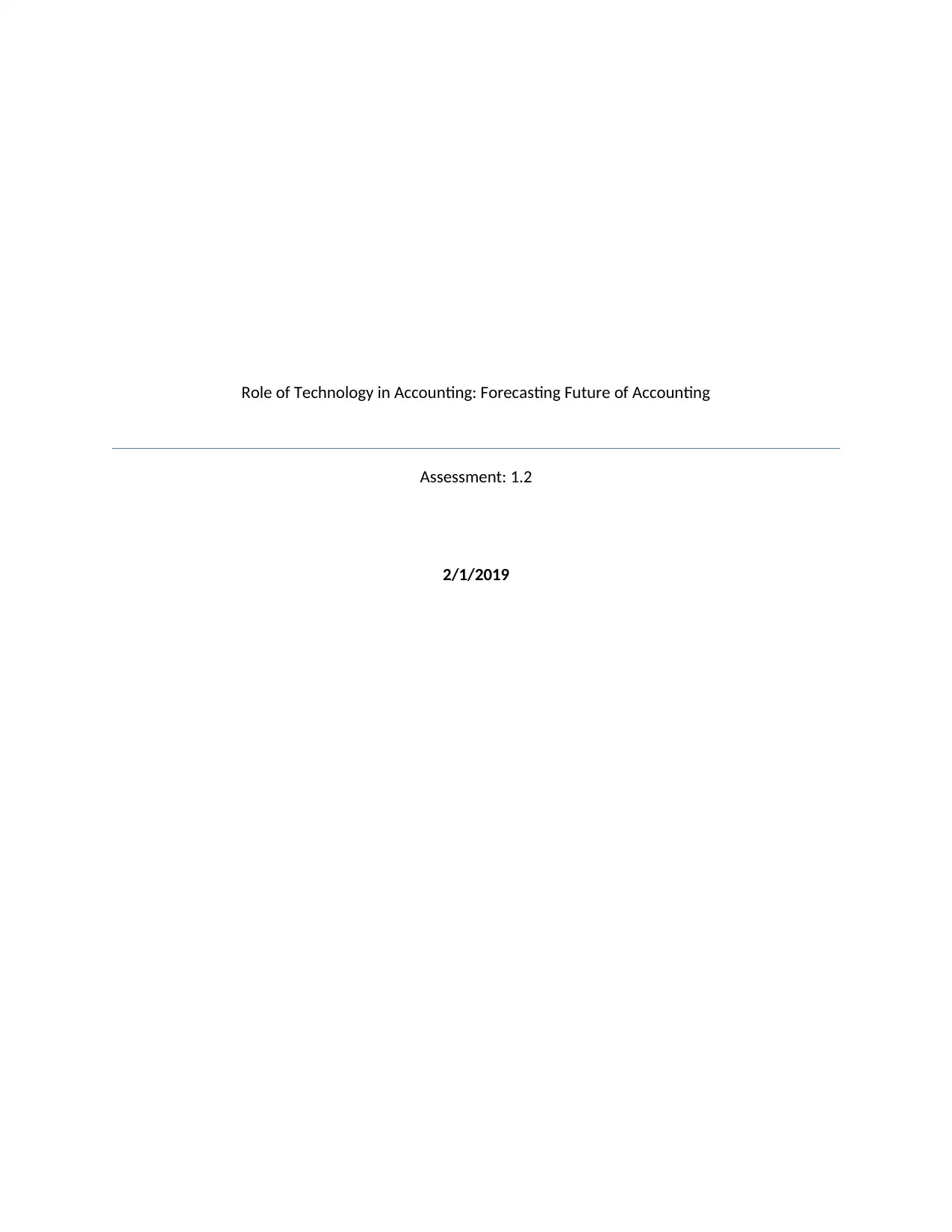
Role of Technology in Accounting: Forecasting Future of Accounting
Assessment: 1.2
2/1/2019
Assessment: 1.2
2/1/2019
Secure Best Marks with AI Grader
Need help grading? Try our AI Grader for instant feedback on your assignments.
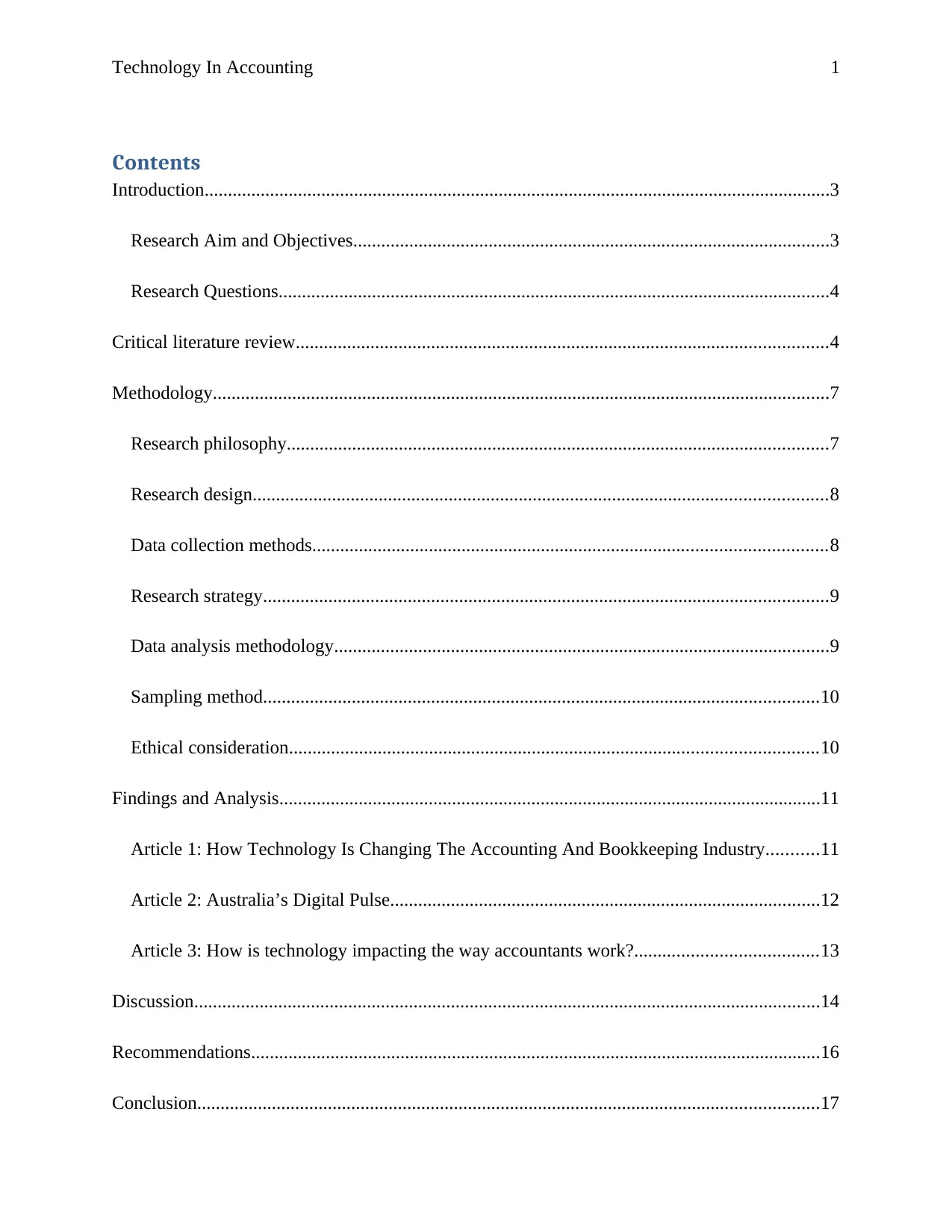
Technology In Accounting 1
Contents
Introduction......................................................................................................................................3
Research Aim and Objectives......................................................................................................3
Research Questions......................................................................................................................4
Critical literature review..................................................................................................................4
Methodology....................................................................................................................................7
Research philosophy....................................................................................................................7
Research design...........................................................................................................................8
Data collection methods..............................................................................................................8
Research strategy.........................................................................................................................9
Data analysis methodology..........................................................................................................9
Sampling method.......................................................................................................................10
Ethical consideration.................................................................................................................10
Findings and Analysis....................................................................................................................11
Article 1: How Technology Is Changing The Accounting And Bookkeeping Industry...........11
Article 2: Australia’s Digital Pulse............................................................................................12
Article 3: How is technology impacting the way accountants work?.......................................13
Discussion......................................................................................................................................14
Recommendations..........................................................................................................................16
Conclusion.....................................................................................................................................17
Contents
Introduction......................................................................................................................................3
Research Aim and Objectives......................................................................................................3
Research Questions......................................................................................................................4
Critical literature review..................................................................................................................4
Methodology....................................................................................................................................7
Research philosophy....................................................................................................................7
Research design...........................................................................................................................8
Data collection methods..............................................................................................................8
Research strategy.........................................................................................................................9
Data analysis methodology..........................................................................................................9
Sampling method.......................................................................................................................10
Ethical consideration.................................................................................................................10
Findings and Analysis....................................................................................................................11
Article 1: How Technology Is Changing The Accounting And Bookkeeping Industry...........11
Article 2: Australia’s Digital Pulse............................................................................................12
Article 3: How is technology impacting the way accountants work?.......................................13
Discussion......................................................................................................................................14
Recommendations..........................................................................................................................16
Conclusion.....................................................................................................................................17
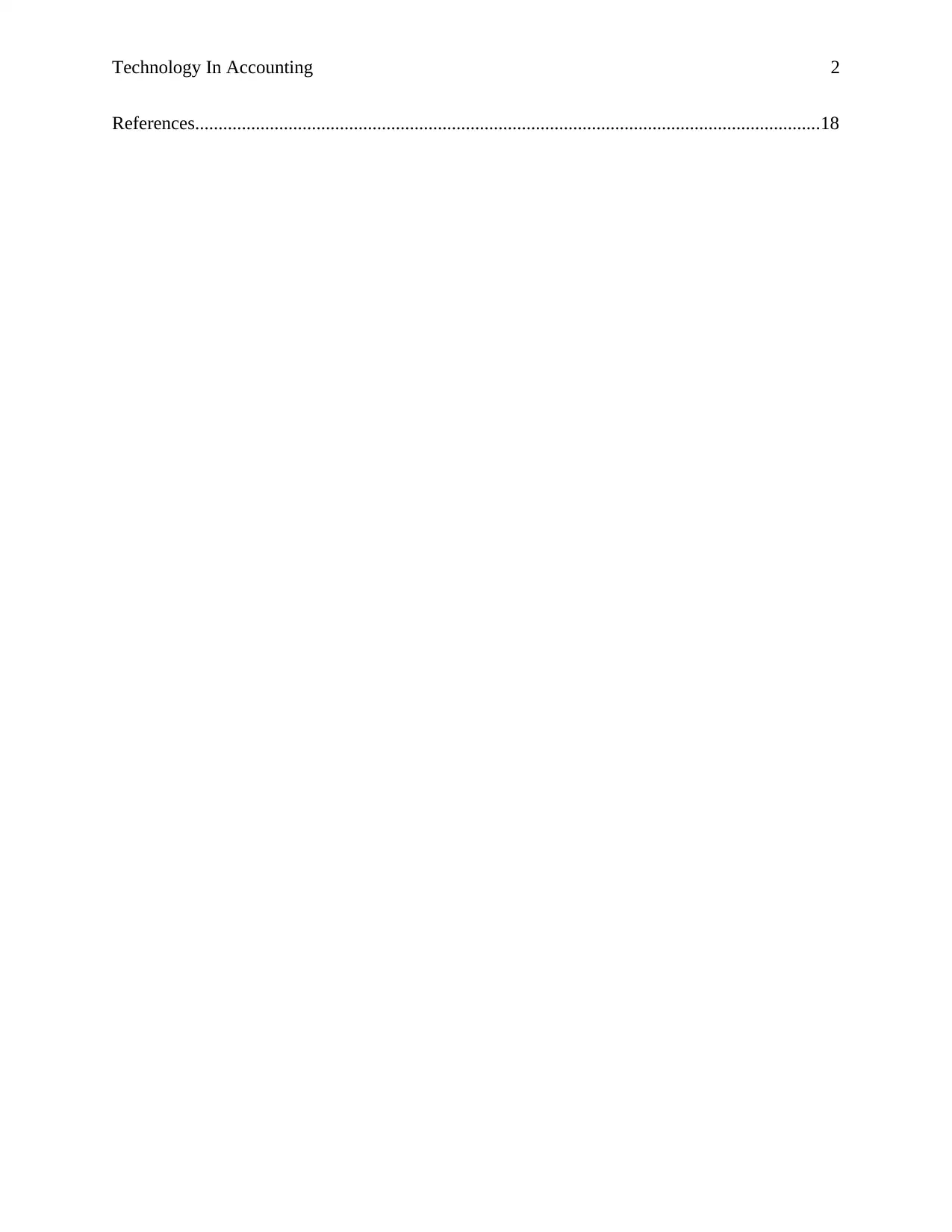
Technology In Accounting 2
References......................................................................................................................................18
References......................................................................................................................................18
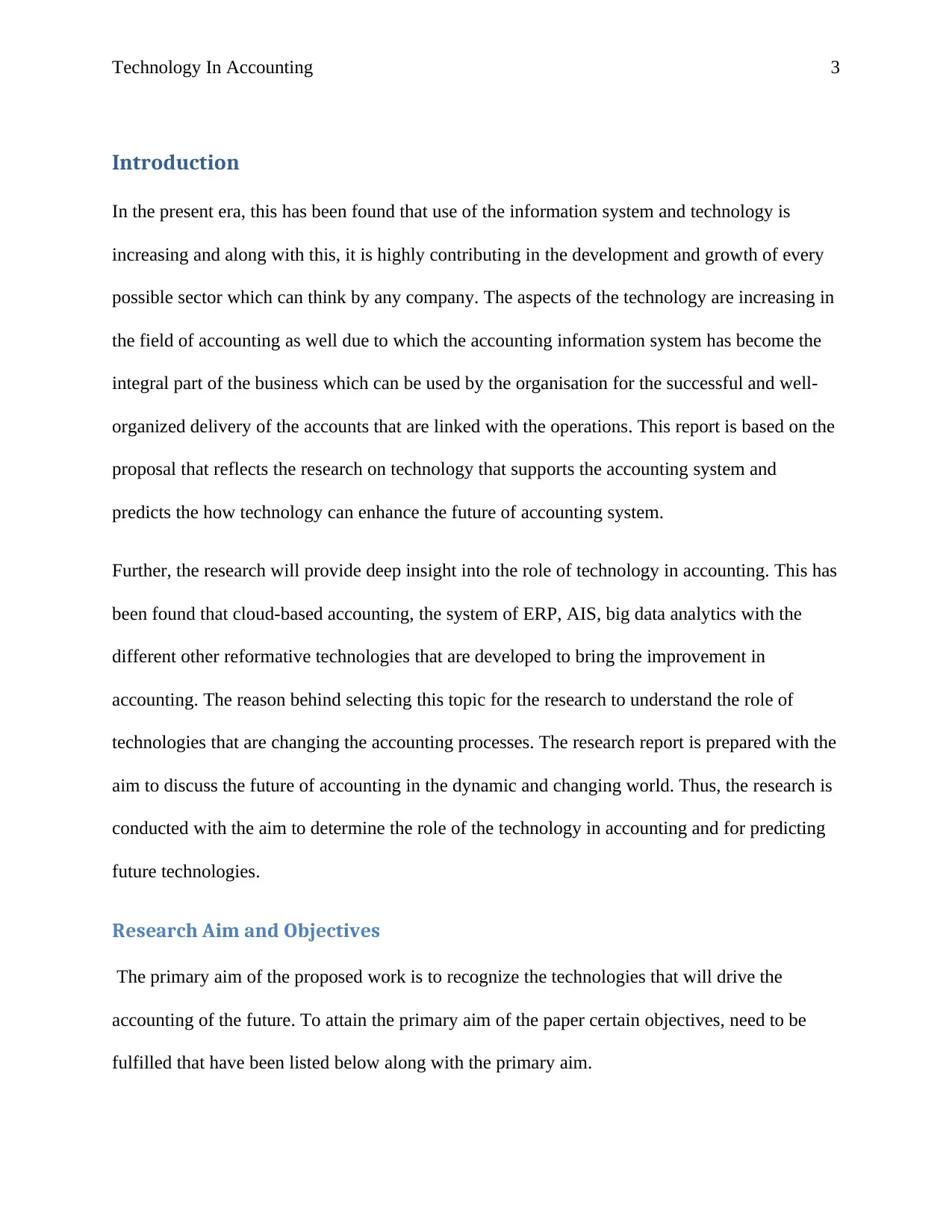
Technology In Accounting 3
Introduction
In the present era, this has been found that use of the information system and technology is
increasing and along with this, it is highly contributing in the development and growth of every
possible sector which can think by any company. The aspects of the technology are increasing in
the field of accounting as well due to which the accounting information system has become the
integral part of the business which can be used by the organisation for the successful and well-
organized delivery of the accounts that are linked with the operations. This report is based on the
proposal that reflects the research on technology that supports the accounting system and
predicts the how technology can enhance the future of accounting system.
Further, the research will provide deep insight into the role of technology in accounting. This has
been found that cloud-based accounting, the system of ERP, AIS, big data analytics with the
different other reformative technologies that are developed to bring the improvement in
accounting. The reason behind selecting this topic for the research to understand the role of
technologies that are changing the accounting processes. The research report is prepared with the
aim to discuss the future of accounting in the dynamic and changing world. Thus, the research is
conducted with the aim to determine the role of the technology in accounting and for predicting
future technologies.
Research Aim and Objectives
The primary aim of the proposed work is to recognize the technologies that will drive the
accounting of the future. To attain the primary aim of the paper certain objectives, need to be
fulfilled that have been listed below along with the primary aim.
Introduction
In the present era, this has been found that use of the information system and technology is
increasing and along with this, it is highly contributing in the development and growth of every
possible sector which can think by any company. The aspects of the technology are increasing in
the field of accounting as well due to which the accounting information system has become the
integral part of the business which can be used by the organisation for the successful and well-
organized delivery of the accounts that are linked with the operations. This report is based on the
proposal that reflects the research on technology that supports the accounting system and
predicts the how technology can enhance the future of accounting system.
Further, the research will provide deep insight into the role of technology in accounting. This has
been found that cloud-based accounting, the system of ERP, AIS, big data analytics with the
different other reformative technologies that are developed to bring the improvement in
accounting. The reason behind selecting this topic for the research to understand the role of
technologies that are changing the accounting processes. The research report is prepared with the
aim to discuss the future of accounting in the dynamic and changing world. Thus, the research is
conducted with the aim to determine the role of the technology in accounting and for predicting
future technologies.
Research Aim and Objectives
The primary aim of the proposed work is to recognize the technologies that will drive the
accounting of the future. To attain the primary aim of the paper certain objectives, need to be
fulfilled that have been listed below along with the primary aim.
Secure Best Marks with AI Grader
Need help grading? Try our AI Grader for instant feedback on your assignments.
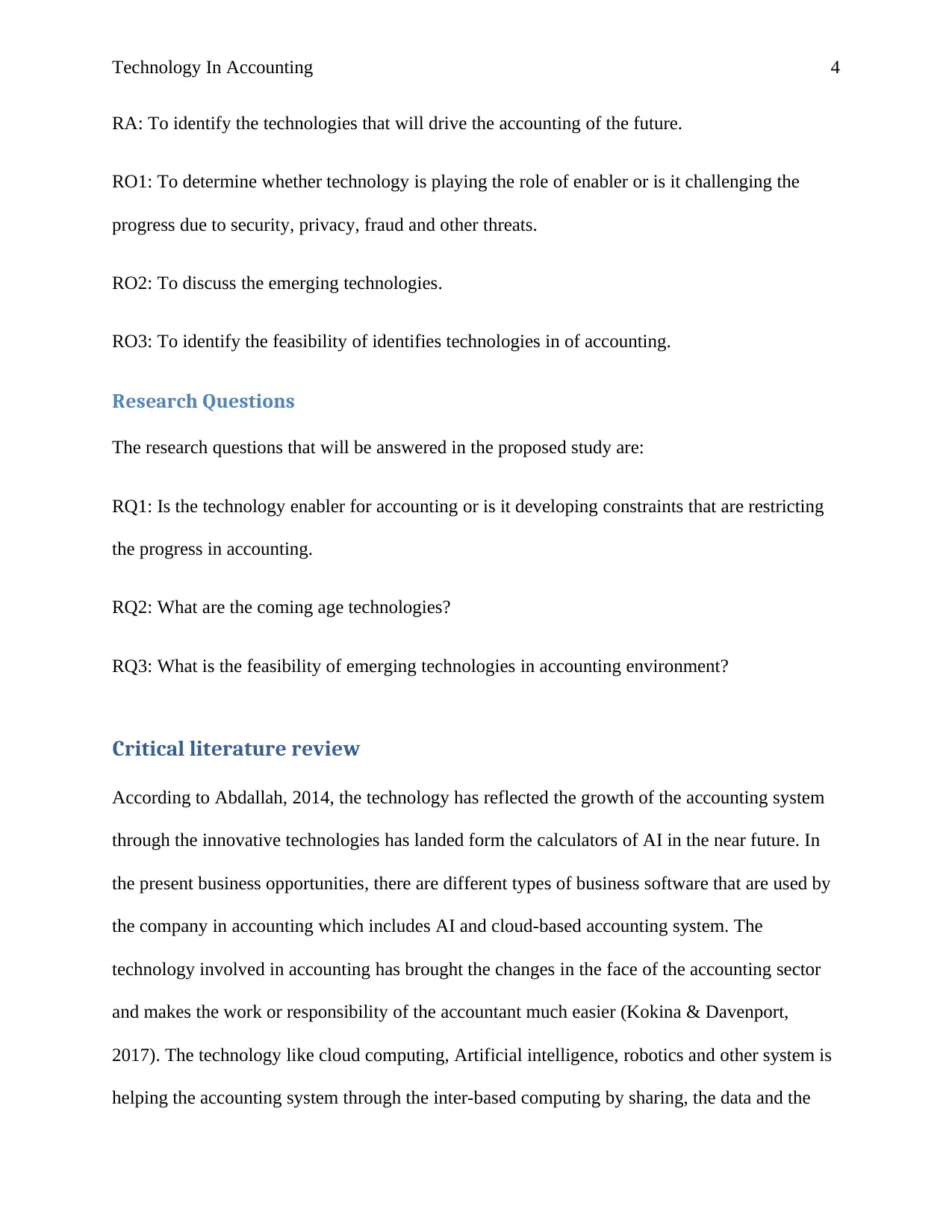
Technology In Accounting 4
RA: To identify the technologies that will drive the accounting of the future.
RO1: To determine whether technology is playing the role of enabler or is it challenging the
progress due to security, privacy, fraud and other threats.
RO2: To discuss the emerging technologies.
RO3: To identify the feasibility of identifies technologies in of accounting.
Research Questions
The research questions that will be answered in the proposed study are:
RQ1: Is the technology enabler for accounting or is it developing constraints that are restricting
the progress in accounting.
RQ2: What are the coming age technologies?
RQ3: What is the feasibility of emerging technologies in accounting environment?
Critical literature review
According to Abdallah, 2014, the technology has reflected the growth of the accounting system
through the innovative technologies has landed form the calculators of AI in the near future. In
the present business opportunities, there are different types of business software that are used by
the company in accounting which includes AI and cloud-based accounting system. The
technology involved in accounting has brought the changes in the face of the accounting sector
and makes the work or responsibility of the accountant much easier (Kokina & Davenport,
2017). The technology like cloud computing, Artificial intelligence, robotics and other system is
helping the accounting system through the inter-based computing by sharing, the data and the
RA: To identify the technologies that will drive the accounting of the future.
RO1: To determine whether technology is playing the role of enabler or is it challenging the
progress due to security, privacy, fraud and other threats.
RO2: To discuss the emerging technologies.
RO3: To identify the feasibility of identifies technologies in of accounting.
Research Questions
The research questions that will be answered in the proposed study are:
RQ1: Is the technology enabler for accounting or is it developing constraints that are restricting
the progress in accounting.
RQ2: What are the coming age technologies?
RQ3: What is the feasibility of emerging technologies in accounting environment?
Critical literature review
According to Abdallah, 2014, the technology has reflected the growth of the accounting system
through the innovative technologies has landed form the calculators of AI in the near future. In
the present business opportunities, there are different types of business software that are used by
the company in accounting which includes AI and cloud-based accounting system. The
technology involved in accounting has brought the changes in the face of the accounting sector
and makes the work or responsibility of the accountant much easier (Kokina & Davenport,
2017). The technology like cloud computing, Artificial intelligence, robotics and other system is
helping the accounting system through the inter-based computing by sharing, the data and the
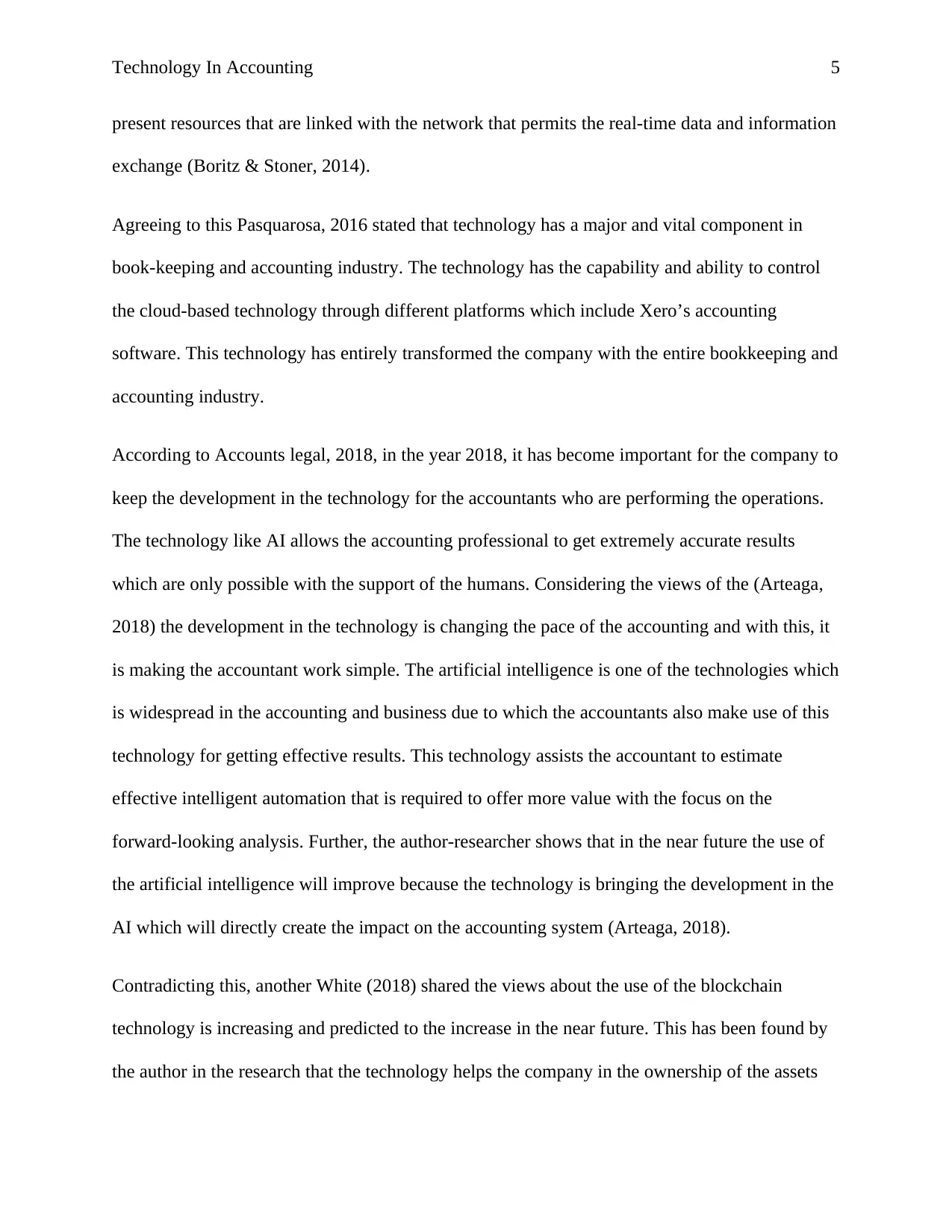
Technology In Accounting 5
present resources that are linked with the network that permits the real-time data and information
exchange (Boritz & Stoner, 2014).
Agreeing to this Pasquarosa, 2016 stated that technology has a major and vital component in
book-keeping and accounting industry. The technology has the capability and ability to control
the cloud-based technology through different platforms which include Xero’s accounting
software. This technology has entirely transformed the company with the entire bookkeeping and
accounting industry.
According to Accounts legal, 2018, in the year 2018, it has become important for the company to
keep the development in the technology for the accountants who are performing the operations.
The technology like AI allows the accounting professional to get extremely accurate results
which are only possible with the support of the humans. Considering the views of the (Arteaga,
2018) the development in the technology is changing the pace of the accounting and with this, it
is making the accountant work simple. The artificial intelligence is one of the technologies which
is widespread in the accounting and business due to which the accountants also make use of this
technology for getting effective results. This technology assists the accountant to estimate
effective intelligent automation that is required to offer more value with the focus on the
forward-looking analysis. Further, the author-researcher shows that in the near future the use of
the artificial intelligence will improve because the technology is bringing the development in the
AI which will directly create the impact on the accounting system (Arteaga, 2018).
Contradicting this, another White (2018) shared the views about the use of the blockchain
technology is increasing and predicted to the increase in the near future. This has been found by
the author in the research that the technology helps the company in the ownership of the assets
present resources that are linked with the network that permits the real-time data and information
exchange (Boritz & Stoner, 2014).
Agreeing to this Pasquarosa, 2016 stated that technology has a major and vital component in
book-keeping and accounting industry. The technology has the capability and ability to control
the cloud-based technology through different platforms which include Xero’s accounting
software. This technology has entirely transformed the company with the entire bookkeeping and
accounting industry.
According to Accounts legal, 2018, in the year 2018, it has become important for the company to
keep the development in the technology for the accountants who are performing the operations.
The technology like AI allows the accounting professional to get extremely accurate results
which are only possible with the support of the humans. Considering the views of the (Arteaga,
2018) the development in the technology is changing the pace of the accounting and with this, it
is making the accountant work simple. The artificial intelligence is one of the technologies which
is widespread in the accounting and business due to which the accountants also make use of this
technology for getting effective results. This technology assists the accountant to estimate
effective intelligent automation that is required to offer more value with the focus on the
forward-looking analysis. Further, the author-researcher shows that in the near future the use of
the artificial intelligence will improve because the technology is bringing the development in the
AI which will directly create the impact on the accounting system (Arteaga, 2018).
Contradicting this, another White (2018) shared the views about the use of the blockchain
technology is increasing and predicted to the increase in the near future. This has been found by
the author in the research that the technology helps the company in the ownership of the assets
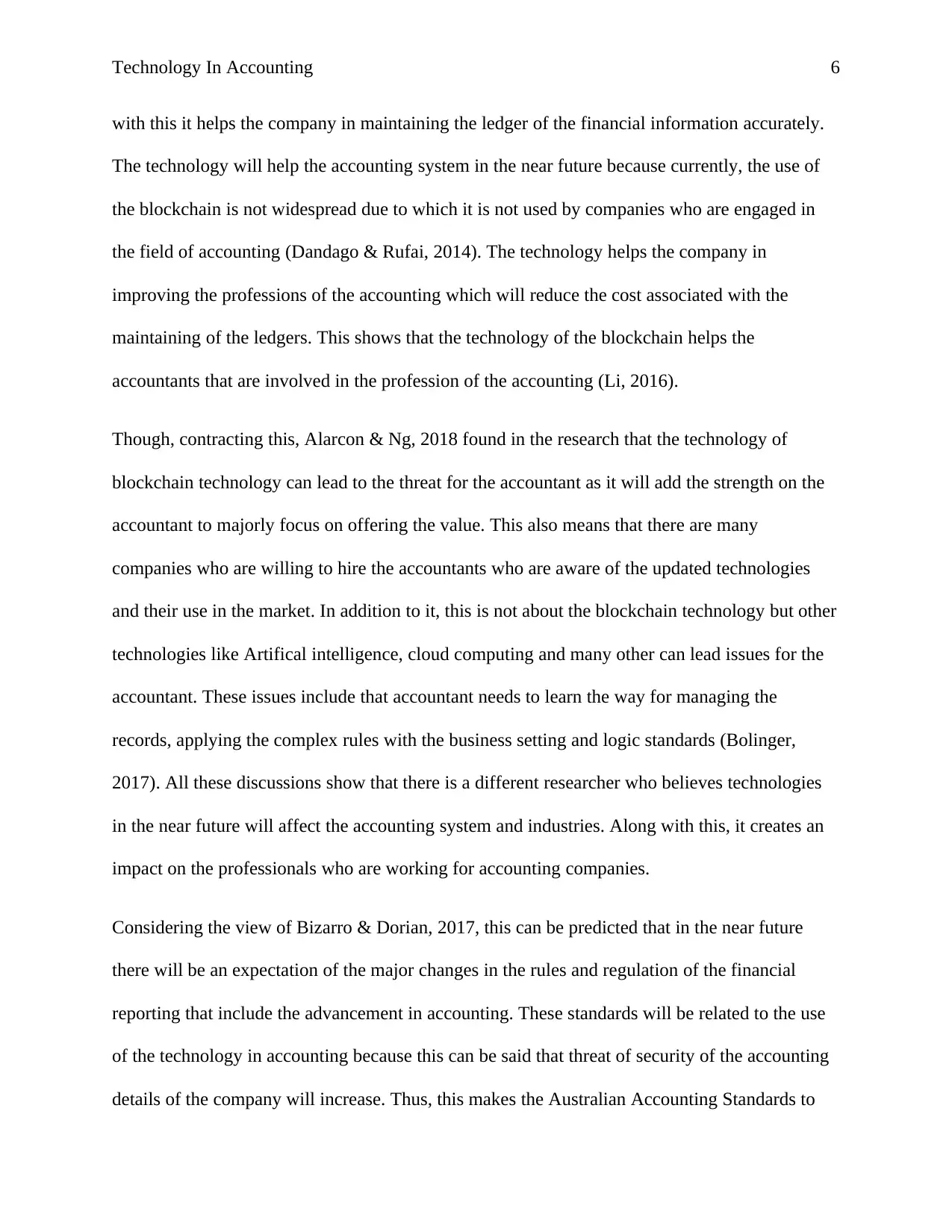
Technology In Accounting 6
with this it helps the company in maintaining the ledger of the financial information accurately.
The technology will help the accounting system in the near future because currently, the use of
the blockchain is not widespread due to which it is not used by companies who are engaged in
the field of accounting (Dandago & Rufai, 2014). The technology helps the company in
improving the professions of the accounting which will reduce the cost associated with the
maintaining of the ledgers. This shows that the technology of the blockchain helps the
accountants that are involved in the profession of the accounting (Li, 2016).
Though, contracting this, Alarcon & Ng, 2018 found in the research that the technology of
blockchain technology can lead to the threat for the accountant as it will add the strength on the
accountant to majorly focus on offering the value. This also means that there are many
companies who are willing to hire the accountants who are aware of the updated technologies
and their use in the market. In addition to it, this is not about the blockchain technology but other
technologies like Artifical intelligence, cloud computing and many other can lead issues for the
accountant. These issues include that accountant needs to learn the way for managing the
records, applying the complex rules with the business setting and logic standards (Bolinger,
2017). All these discussions show that there is a different researcher who believes technologies
in the near future will affect the accounting system and industries. Along with this, it creates an
impact on the professionals who are working for accounting companies.
Considering the view of Bizarro & Dorian, 2017, this can be predicted that in the near future
there will be an expectation of the major changes in the rules and regulation of the financial
reporting that include the advancement in accounting. These standards will be related to the use
of the technology in accounting because this can be said that threat of security of the accounting
details of the company will increase. Thus, this makes the Australian Accounting Standards to
with this it helps the company in maintaining the ledger of the financial information accurately.
The technology will help the accounting system in the near future because currently, the use of
the blockchain is not widespread due to which it is not used by companies who are engaged in
the field of accounting (Dandago & Rufai, 2014). The technology helps the company in
improving the professions of the accounting which will reduce the cost associated with the
maintaining of the ledgers. This shows that the technology of the blockchain helps the
accountants that are involved in the profession of the accounting (Li, 2016).
Though, contracting this, Alarcon & Ng, 2018 found in the research that the technology of
blockchain technology can lead to the threat for the accountant as it will add the strength on the
accountant to majorly focus on offering the value. This also means that there are many
companies who are willing to hire the accountants who are aware of the updated technologies
and their use in the market. In addition to it, this is not about the blockchain technology but other
technologies like Artifical intelligence, cloud computing and many other can lead issues for the
accountant. These issues include that accountant needs to learn the way for managing the
records, applying the complex rules with the business setting and logic standards (Bolinger,
2017). All these discussions show that there is a different researcher who believes technologies
in the near future will affect the accounting system and industries. Along with this, it creates an
impact on the professionals who are working for accounting companies.
Considering the view of Bizarro & Dorian, 2017, this can be predicted that in the near future
there will be an expectation of the major changes in the rules and regulation of the financial
reporting that include the advancement in accounting. These standards will be related to the use
of the technology in accounting because this can be said that threat of security of the accounting
details of the company will increase. Thus, this makes the Australian Accounting Standards to
Paraphrase This Document
Need a fresh take? Get an instant paraphrase of this document with our AI Paraphraser
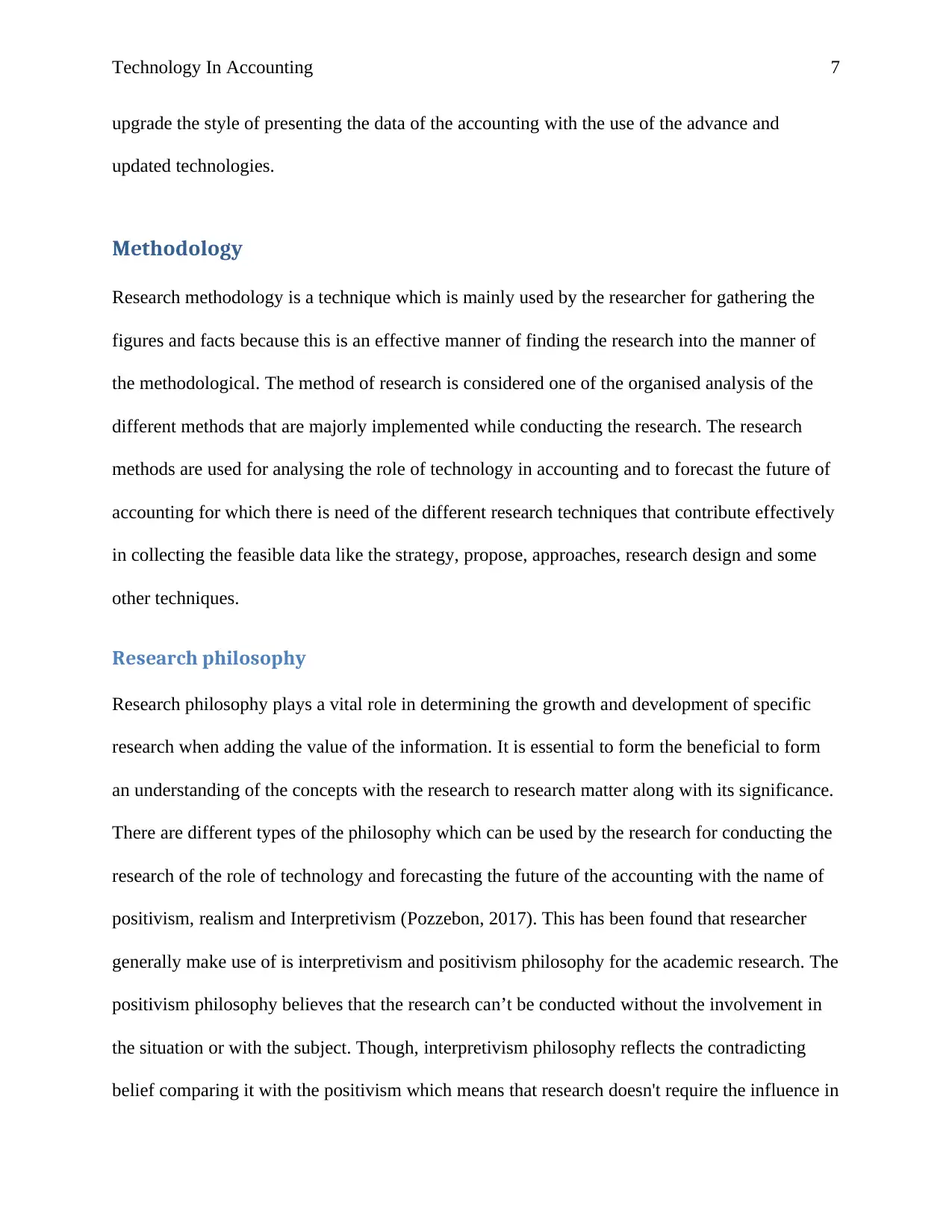
Technology In Accounting 7
upgrade the style of presenting the data of the accounting with the use of the advance and
updated technologies.
Methodology
Research methodology is a technique which is mainly used by the researcher for gathering the
figures and facts because this is an effective manner of finding the research into the manner of
the methodological. The method of research is considered one of the organised analysis of the
different methods that are majorly implemented while conducting the research. The research
methods are used for analysing the role of technology in accounting and to forecast the future of
accounting for which there is need of the different research techniques that contribute effectively
in collecting the feasible data like the strategy, propose, approaches, research design and some
other techniques.
Research philosophy
Research philosophy plays a vital role in determining the growth and development of specific
research when adding the value of the information. It is essential to form the beneficial to form
an understanding of the concepts with the research to research matter along with its significance.
There are different types of the philosophy which can be used by the research for conducting the
research of the role of technology and forecasting the future of the accounting with the name of
positivism, realism and Interpretivism (Pozzebon, 2017). This has been found that researcher
generally make use of is interpretivism and positivism philosophy for the academic research. The
positivism philosophy believes that the research can’t be conducted without the involvement in
the situation or with the subject. Though, interpretivism philosophy reflects the contradicting
belief comparing it with the positivism which means that research doesn't require the influence in
upgrade the style of presenting the data of the accounting with the use of the advance and
updated technologies.
Methodology
Research methodology is a technique which is mainly used by the researcher for gathering the
figures and facts because this is an effective manner of finding the research into the manner of
the methodological. The method of research is considered one of the organised analysis of the
different methods that are majorly implemented while conducting the research. The research
methods are used for analysing the role of technology in accounting and to forecast the future of
accounting for which there is need of the different research techniques that contribute effectively
in collecting the feasible data like the strategy, propose, approaches, research design and some
other techniques.
Research philosophy
Research philosophy plays a vital role in determining the growth and development of specific
research when adding the value of the information. It is essential to form the beneficial to form
an understanding of the concepts with the research to research matter along with its significance.
There are different types of the philosophy which can be used by the research for conducting the
research of the role of technology and forecasting the future of the accounting with the name of
positivism, realism and Interpretivism (Pozzebon, 2017). This has been found that researcher
generally make use of is interpretivism and positivism philosophy for the academic research. The
positivism philosophy believes that the research can’t be conducted without the involvement in
the situation or with the subject. Though, interpretivism philosophy reflects the contradicting
belief comparing it with the positivism which means that research doesn't require the influence in
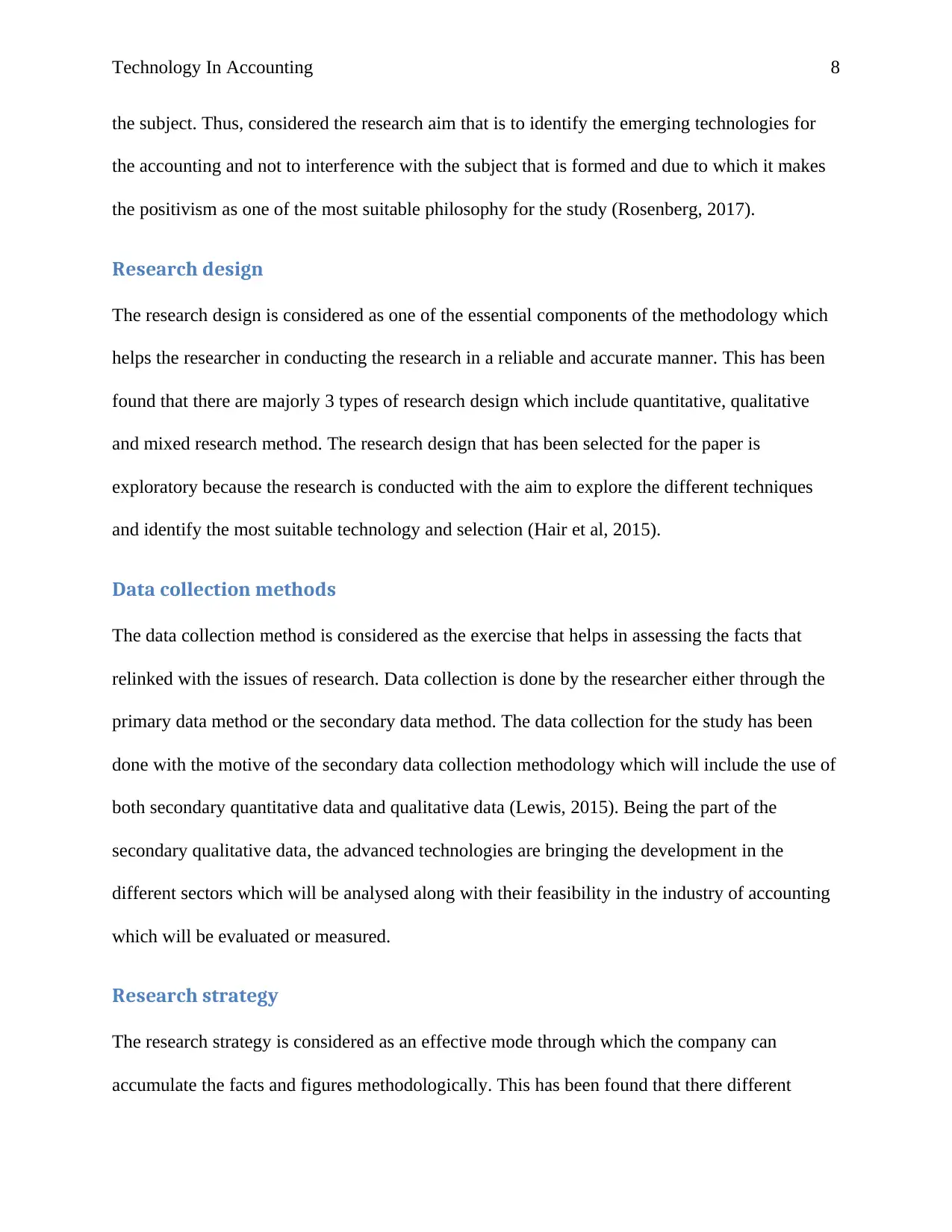
Technology In Accounting 8
the subject. Thus, considered the research aim that is to identify the emerging technologies for
the accounting and not to interference with the subject that is formed and due to which it makes
the positivism as one of the most suitable philosophy for the study (Rosenberg, 2017).
Research design
The research design is considered as one of the essential components of the methodology which
helps the researcher in conducting the research in a reliable and accurate manner. This has been
found that there are majorly 3 types of research design which include quantitative, qualitative
and mixed research method. The research design that has been selected for the paper is
exploratory because the research is conducted with the aim to explore the different techniques
and identify the most suitable technology and selection (Hair et al, 2015).
Data collection methods
The data collection method is considered as the exercise that helps in assessing the facts that
relinked with the issues of research. Data collection is done by the researcher either through the
primary data method or the secondary data method. The data collection for the study has been
done with the motive of the secondary data collection methodology which will include the use of
both secondary quantitative data and qualitative data (Lewis, 2015). Being the part of the
secondary qualitative data, the advanced technologies are bringing the development in the
different sectors which will be analysed along with their feasibility in the industry of accounting
which will be evaluated or measured.
Research strategy
The research strategy is considered as an effective mode through which the company can
accumulate the facts and figures methodologically. This has been found that there different
the subject. Thus, considered the research aim that is to identify the emerging technologies for
the accounting and not to interference with the subject that is formed and due to which it makes
the positivism as one of the most suitable philosophy for the study (Rosenberg, 2017).
Research design
The research design is considered as one of the essential components of the methodology which
helps the researcher in conducting the research in a reliable and accurate manner. This has been
found that there are majorly 3 types of research design which include quantitative, qualitative
and mixed research method. The research design that has been selected for the paper is
exploratory because the research is conducted with the aim to explore the different techniques
and identify the most suitable technology and selection (Hair et al, 2015).
Data collection methods
The data collection method is considered as the exercise that helps in assessing the facts that
relinked with the issues of research. Data collection is done by the researcher either through the
primary data method or the secondary data method. The data collection for the study has been
done with the motive of the secondary data collection methodology which will include the use of
both secondary quantitative data and qualitative data (Lewis, 2015). Being the part of the
secondary qualitative data, the advanced technologies are bringing the development in the
different sectors which will be analysed along with their feasibility in the industry of accounting
which will be evaluated or measured.
Research strategy
The research strategy is considered as an effective mode through which the company can
accumulate the facts and figures methodologically. This has been found that there different
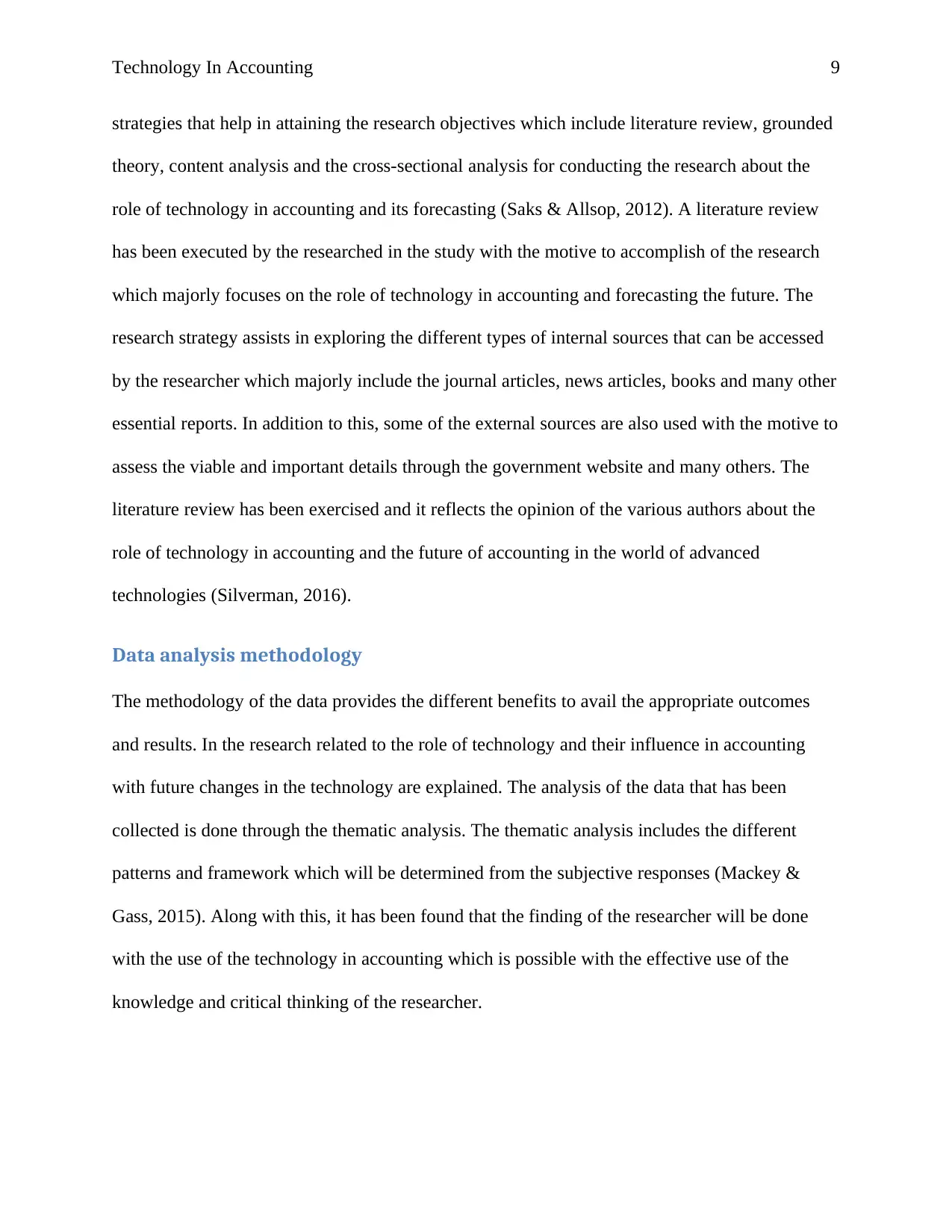
Technology In Accounting 9
strategies that help in attaining the research objectives which include literature review, grounded
theory, content analysis and the cross-sectional analysis for conducting the research about the
role of technology in accounting and its forecasting (Saks & Allsop, 2012). A literature review
has been executed by the researched in the study with the motive to accomplish of the research
which majorly focuses on the role of technology in accounting and forecasting the future. The
research strategy assists in exploring the different types of internal sources that can be accessed
by the researcher which majorly include the journal articles, news articles, books and many other
essential reports. In addition to this, some of the external sources are also used with the motive to
assess the viable and important details through the government website and many others. The
literature review has been exercised and it reflects the opinion of the various authors about the
role of technology in accounting and the future of accounting in the world of advanced
technologies (Silverman, 2016).
Data analysis methodology
The methodology of the data provides the different benefits to avail the appropriate outcomes
and results. In the research related to the role of technology and their influence in accounting
with future changes in the technology are explained. The analysis of the data that has been
collected is done through the thematic analysis. The thematic analysis includes the different
patterns and framework which will be determined from the subjective responses (Mackey &
Gass, 2015). Along with this, it has been found that the finding of the researcher will be done
with the use of the technology in accounting which is possible with the effective use of the
knowledge and critical thinking of the researcher.
strategies that help in attaining the research objectives which include literature review, grounded
theory, content analysis and the cross-sectional analysis for conducting the research about the
role of technology in accounting and its forecasting (Saks & Allsop, 2012). A literature review
has been executed by the researched in the study with the motive to accomplish of the research
which majorly focuses on the role of technology in accounting and forecasting the future. The
research strategy assists in exploring the different types of internal sources that can be accessed
by the researcher which majorly include the journal articles, news articles, books and many other
essential reports. In addition to this, some of the external sources are also used with the motive to
assess the viable and important details through the government website and many others. The
literature review has been exercised and it reflects the opinion of the various authors about the
role of technology in accounting and the future of accounting in the world of advanced
technologies (Silverman, 2016).
Data analysis methodology
The methodology of the data provides the different benefits to avail the appropriate outcomes
and results. In the research related to the role of technology and their influence in accounting
with future changes in the technology are explained. The analysis of the data that has been
collected is done through the thematic analysis. The thematic analysis includes the different
patterns and framework which will be determined from the subjective responses (Mackey &
Gass, 2015). Along with this, it has been found that the finding of the researcher will be done
with the use of the technology in accounting which is possible with the effective use of the
knowledge and critical thinking of the researcher.
Secure Best Marks with AI Grader
Need help grading? Try our AI Grader for instant feedback on your assignments.
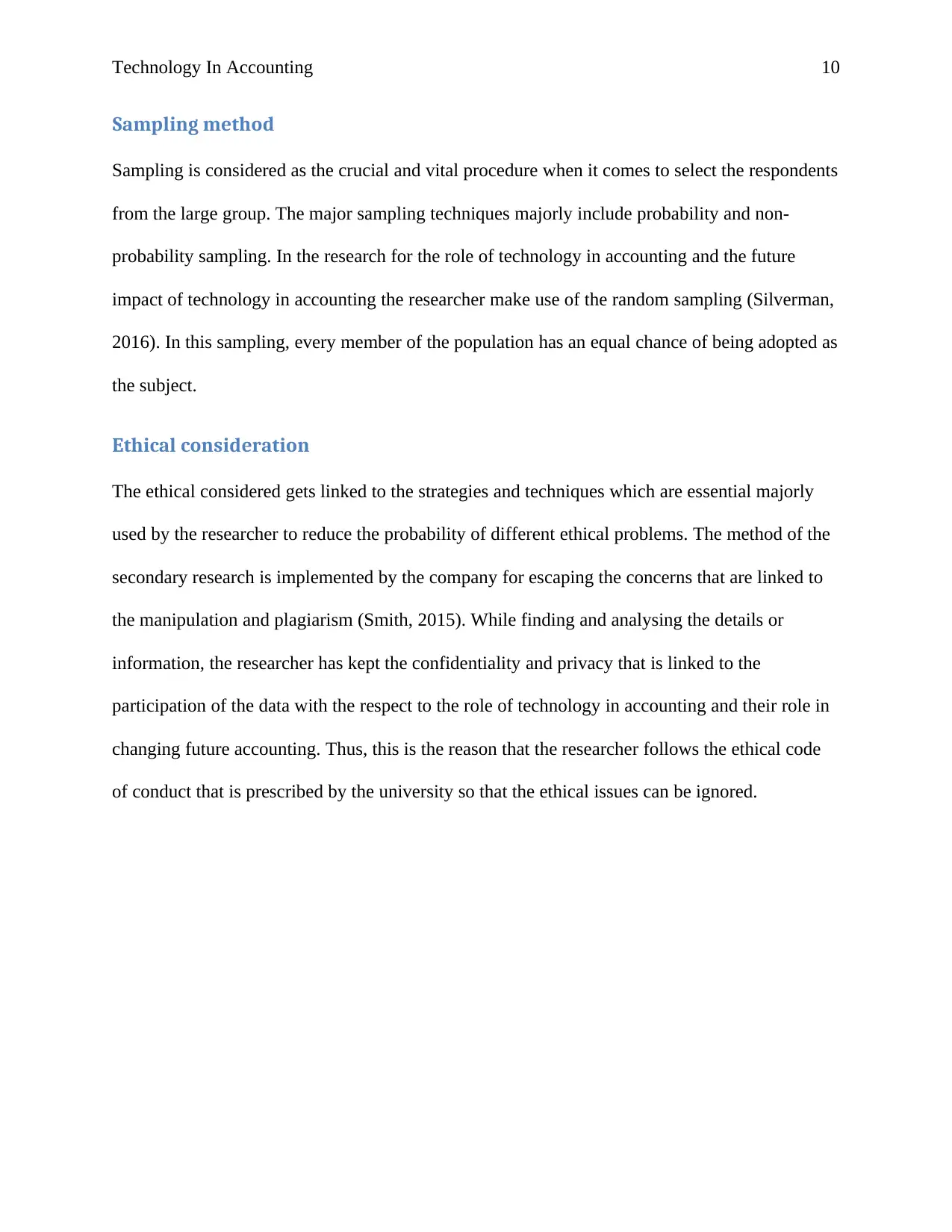
Technology In Accounting 10
Sampling method
Sampling is considered as the crucial and vital procedure when it comes to select the respondents
from the large group. The major sampling techniques majorly include probability and non-
probability sampling. In the research for the role of technology in accounting and the future
impact of technology in accounting the researcher make use of the random sampling (Silverman,
2016). In this sampling, every member of the population has an equal chance of being adopted as
the subject.
Ethical consideration
The ethical considered gets linked to the strategies and techniques which are essential majorly
used by the researcher to reduce the probability of different ethical problems. The method of the
secondary research is implemented by the company for escaping the concerns that are linked to
the manipulation and plagiarism (Smith, 2015). While finding and analysing the details or
information, the researcher has kept the confidentiality and privacy that is linked to the
participation of the data with the respect to the role of technology in accounting and their role in
changing future accounting. Thus, this is the reason that the researcher follows the ethical code
of conduct that is prescribed by the university so that the ethical issues can be ignored.
Sampling method
Sampling is considered as the crucial and vital procedure when it comes to select the respondents
from the large group. The major sampling techniques majorly include probability and non-
probability sampling. In the research for the role of technology in accounting and the future
impact of technology in accounting the researcher make use of the random sampling (Silverman,
2016). In this sampling, every member of the population has an equal chance of being adopted as
the subject.
Ethical consideration
The ethical considered gets linked to the strategies and techniques which are essential majorly
used by the researcher to reduce the probability of different ethical problems. The method of the
secondary research is implemented by the company for escaping the concerns that are linked to
the manipulation and plagiarism (Smith, 2015). While finding and analysing the details or
information, the researcher has kept the confidentiality and privacy that is linked to the
participation of the data with the respect to the role of technology in accounting and their role in
changing future accounting. Thus, this is the reason that the researcher follows the ethical code
of conduct that is prescribed by the university so that the ethical issues can be ignored.
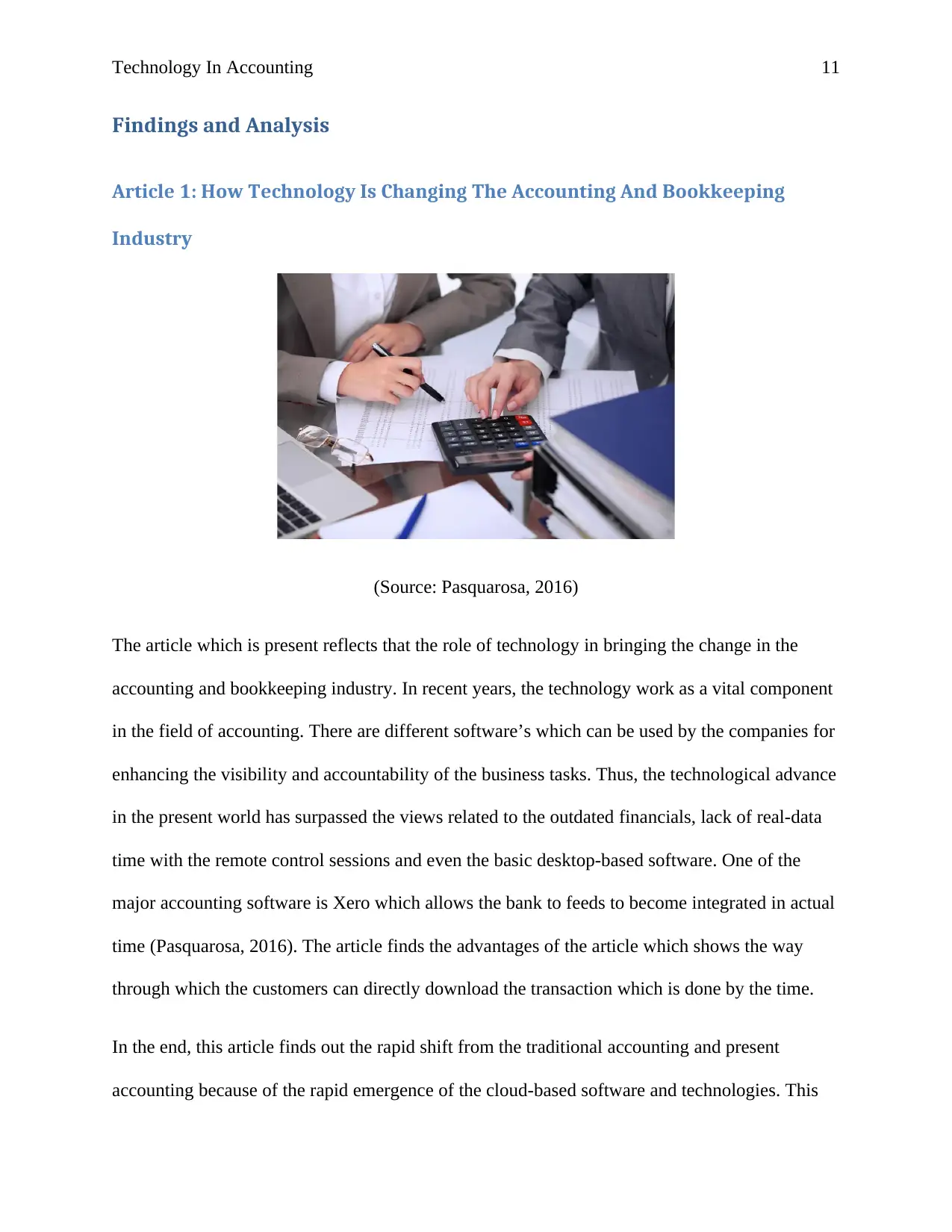
Technology In Accounting 11
Findings and Analysis
1Article : How Technology Is Changing The Accounting And Bookkeeping
Industry
(Source: Pasquarosa, 2016)
The article which is present reflects that the role of technology in bringing the change in the
accounting and bookkeeping industry. In recent years, the technology work as a vital component
in the field of accounting. There are different software’s which can be used by the companies for
enhancing the visibility and accountability of the business tasks. Thus, the technological advance
in the present world has surpassed the views related to the outdated financials, lack of real-data
time with the remote control sessions and even the basic desktop-based software. One of the
major accounting software is Xero which allows the bank to feeds to become integrated in actual
time (Pasquarosa, 2016). The article finds the advantages of the article which shows the way
through which the customers can directly download the transaction which is done by the time.
In the end, this article finds out the rapid shift from the traditional accounting and present
accounting because of the rapid emergence of the cloud-based software and technologies. This
Findings and Analysis
1Article : How Technology Is Changing The Accounting And Bookkeeping
Industry
(Source: Pasquarosa, 2016)
The article which is present reflects that the role of technology in bringing the change in the
accounting and bookkeeping industry. In recent years, the technology work as a vital component
in the field of accounting. There are different software’s which can be used by the companies for
enhancing the visibility and accountability of the business tasks. Thus, the technological advance
in the present world has surpassed the views related to the outdated financials, lack of real-data
time with the remote control sessions and even the basic desktop-based software. One of the
major accounting software is Xero which allows the bank to feeds to become integrated in actual
time (Pasquarosa, 2016). The article finds the advantages of the article which shows the way
through which the customers can directly download the transaction which is done by the time.
In the end, this article finds out the rapid shift from the traditional accounting and present
accounting because of the rapid emergence of the cloud-based software and technologies. This
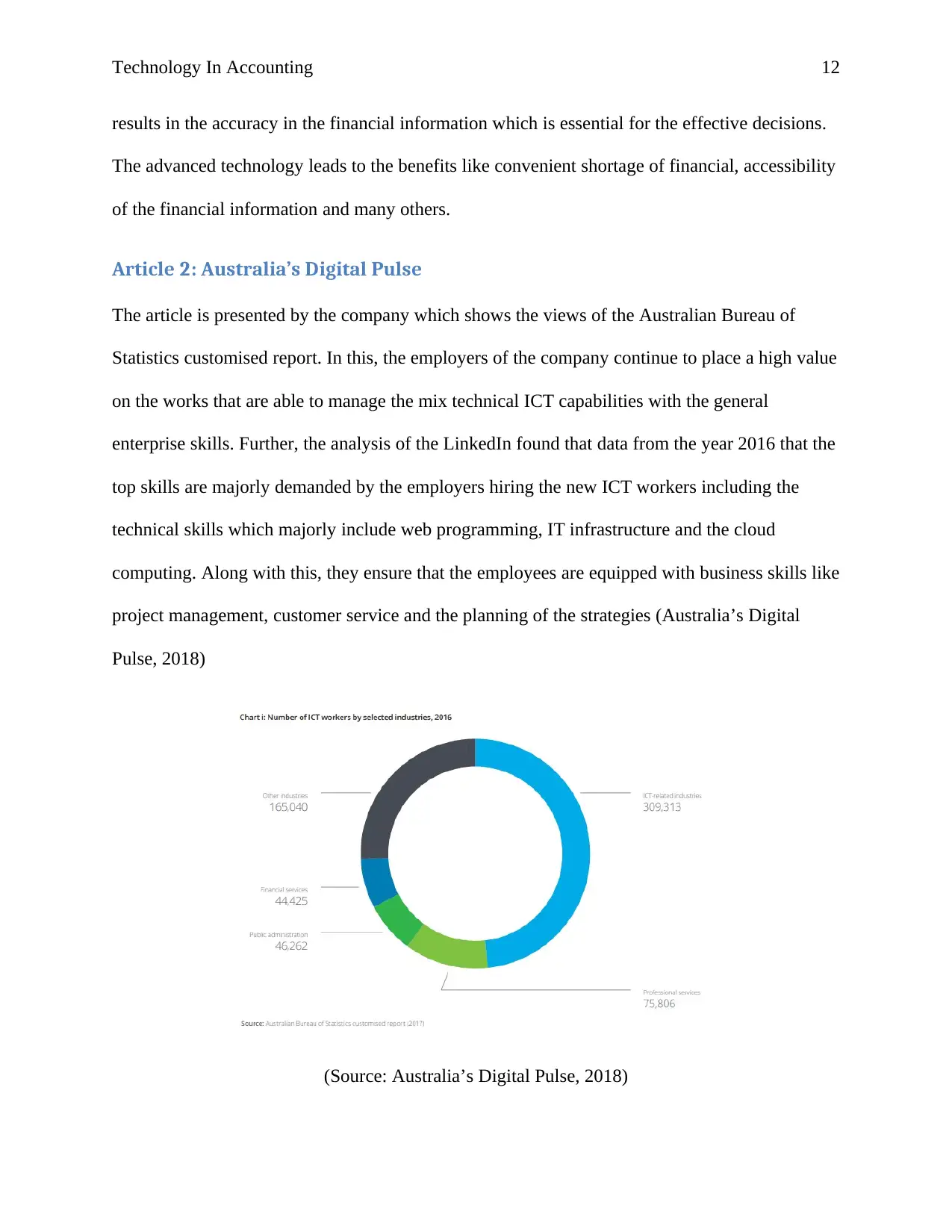
Technology In Accounting 12
results in the accuracy in the financial information which is essential for the effective decisions.
The advanced technology leads to the benefits like convenient shortage of financial, accessibility
of the financial information and many others.
Article 2: Australia’s Digital Pulse
The article is presented by the company which shows the views of the Australian Bureau of
Statistics customised report. In this, the employers of the company continue to place a high value
on the works that are able to manage the mix technical ICT capabilities with the general
enterprise skills. Further, the analysis of the LinkedIn found that data from the year 2016 that the
top skills are majorly demanded by the employers hiring the new ICT workers including the
technical skills which majorly include web programming, IT infrastructure and the cloud
computing. Along with this, they ensure that the employees are equipped with business skills like
project management, customer service and the planning of the strategies (Australia’s Digital
Pulse, 2018)
(Source: Australia’s Digital Pulse, 2018)
results in the accuracy in the financial information which is essential for the effective decisions.
The advanced technology leads to the benefits like convenient shortage of financial, accessibility
of the financial information and many others.
Article 2: Australia’s Digital Pulse
The article is presented by the company which shows the views of the Australian Bureau of
Statistics customised report. In this, the employers of the company continue to place a high value
on the works that are able to manage the mix technical ICT capabilities with the general
enterprise skills. Further, the analysis of the LinkedIn found that data from the year 2016 that the
top skills are majorly demanded by the employers hiring the new ICT workers including the
technical skills which majorly include web programming, IT infrastructure and the cloud
computing. Along with this, they ensure that the employees are equipped with business skills like
project management, customer service and the planning of the strategies (Australia’s Digital
Pulse, 2018)
(Source: Australia’s Digital Pulse, 2018)
Paraphrase This Document
Need a fresh take? Get an instant paraphrase of this document with our AI Paraphraser
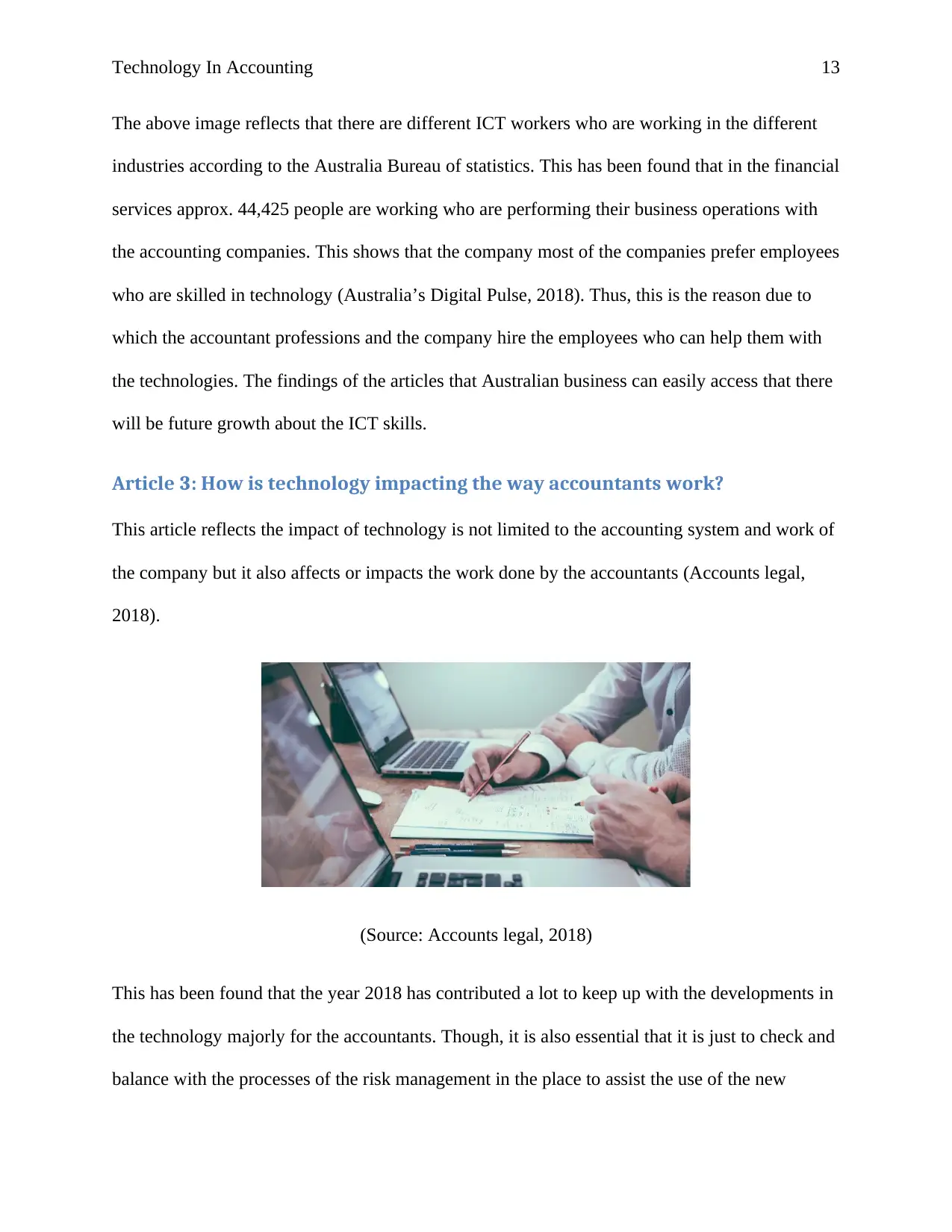
Technology In Accounting 13
The above image reflects that there are different ICT workers who are working in the different
industries according to the Australia Bureau of statistics. This has been found that in the financial
services approx. 44,425 people are working who are performing their business operations with
the accounting companies. This shows that the company most of the companies prefer employees
who are skilled in technology (Australia’s Digital Pulse, 2018). Thus, this is the reason due to
which the accountant professions and the company hire the employees who can help them with
the technologies. The findings of the articles that Australian business can easily access that there
will be future growth about the ICT skills.
Article 3: How is technology impacting the way accountants work?
This article reflects the impact of technology is not limited to the accounting system and work of
the company but it also affects or impacts the work done by the accountants (Accounts legal,
2018).
(Source: Accounts legal, 2018)
This has been found that the year 2018 has contributed a lot to keep up with the developments in
the technology majorly for the accountants. Though, it is also essential that it is just to check and
balance with the processes of the risk management in the place to assist the use of the new
The above image reflects that there are different ICT workers who are working in the different
industries according to the Australia Bureau of statistics. This has been found that in the financial
services approx. 44,425 people are working who are performing their business operations with
the accounting companies. This shows that the company most of the companies prefer employees
who are skilled in technology (Australia’s Digital Pulse, 2018). Thus, this is the reason due to
which the accountant professions and the company hire the employees who can help them with
the technologies. The findings of the articles that Australian business can easily access that there
will be future growth about the ICT skills.
Article 3: How is technology impacting the way accountants work?
This article reflects the impact of technology is not limited to the accounting system and work of
the company but it also affects or impacts the work done by the accountants (Accounts legal,
2018).
(Source: Accounts legal, 2018)
This has been found that the year 2018 has contributed a lot to keep up with the developments in
the technology majorly for the accountants. Though, it is also essential that it is just to check and
balance with the processes of the risk management in the place to assist the use of the new
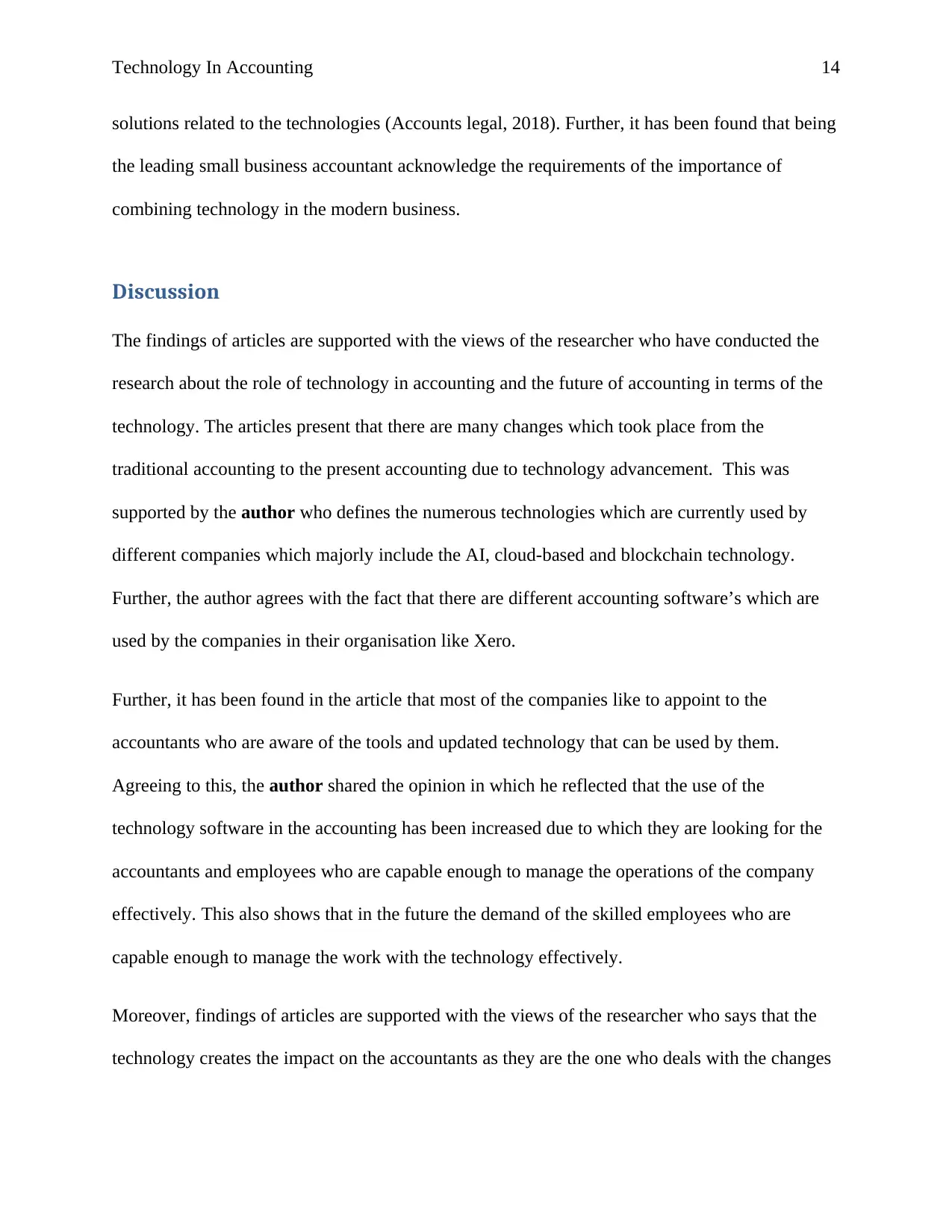
Technology In Accounting 14
solutions related to the technologies (Accounts legal, 2018). Further, it has been found that being
the leading small business accountant acknowledge the requirements of the importance of
combining technology in the modern business.
Discussion
The findings of articles are supported with the views of the researcher who have conducted the
research about the role of technology in accounting and the future of accounting in terms of the
technology. The articles present that there are many changes which took place from the
traditional accounting to the present accounting due to technology advancement. This was
supported by the author who defines the numerous technologies which are currently used by
different companies which majorly include the AI, cloud-based and blockchain technology.
Further, the author agrees with the fact that there are different accounting software’s which are
used by the companies in their organisation like Xero.
Further, it has been found in the article that most of the companies like to appoint to the
accountants who are aware of the tools and updated technology that can be used by them.
Agreeing to this, the author shared the opinion in which he reflected that the use of the
technology software in the accounting has been increased due to which they are looking for the
accountants and employees who are capable enough to manage the operations of the company
effectively. This also shows that in the future the demand of the skilled employees who are
capable enough to manage the work with the technology effectively.
Moreover, findings of articles are supported with the views of the researcher who says that the
technology creates the impact on the accountants as they are the one who deals with the changes
solutions related to the technologies (Accounts legal, 2018). Further, it has been found that being
the leading small business accountant acknowledge the requirements of the importance of
combining technology in the modern business.
Discussion
The findings of articles are supported with the views of the researcher who have conducted the
research about the role of technology in accounting and the future of accounting in terms of the
technology. The articles present that there are many changes which took place from the
traditional accounting to the present accounting due to technology advancement. This was
supported by the author who defines the numerous technologies which are currently used by
different companies which majorly include the AI, cloud-based and blockchain technology.
Further, the author agrees with the fact that there are different accounting software’s which are
used by the companies in their organisation like Xero.
Further, it has been found in the article that most of the companies like to appoint to the
accountants who are aware of the tools and updated technology that can be used by them.
Agreeing to this, the author shared the opinion in which he reflected that the use of the
technology software in the accounting has been increased due to which they are looking for the
accountants and employees who are capable enough to manage the operations of the company
effectively. This also shows that in the future the demand of the skilled employees who are
capable enough to manage the work with the technology effectively.
Moreover, findings of articles are supported with the views of the researcher who says that the
technology creates the impact on the accountants as they are the one who deals with the changes
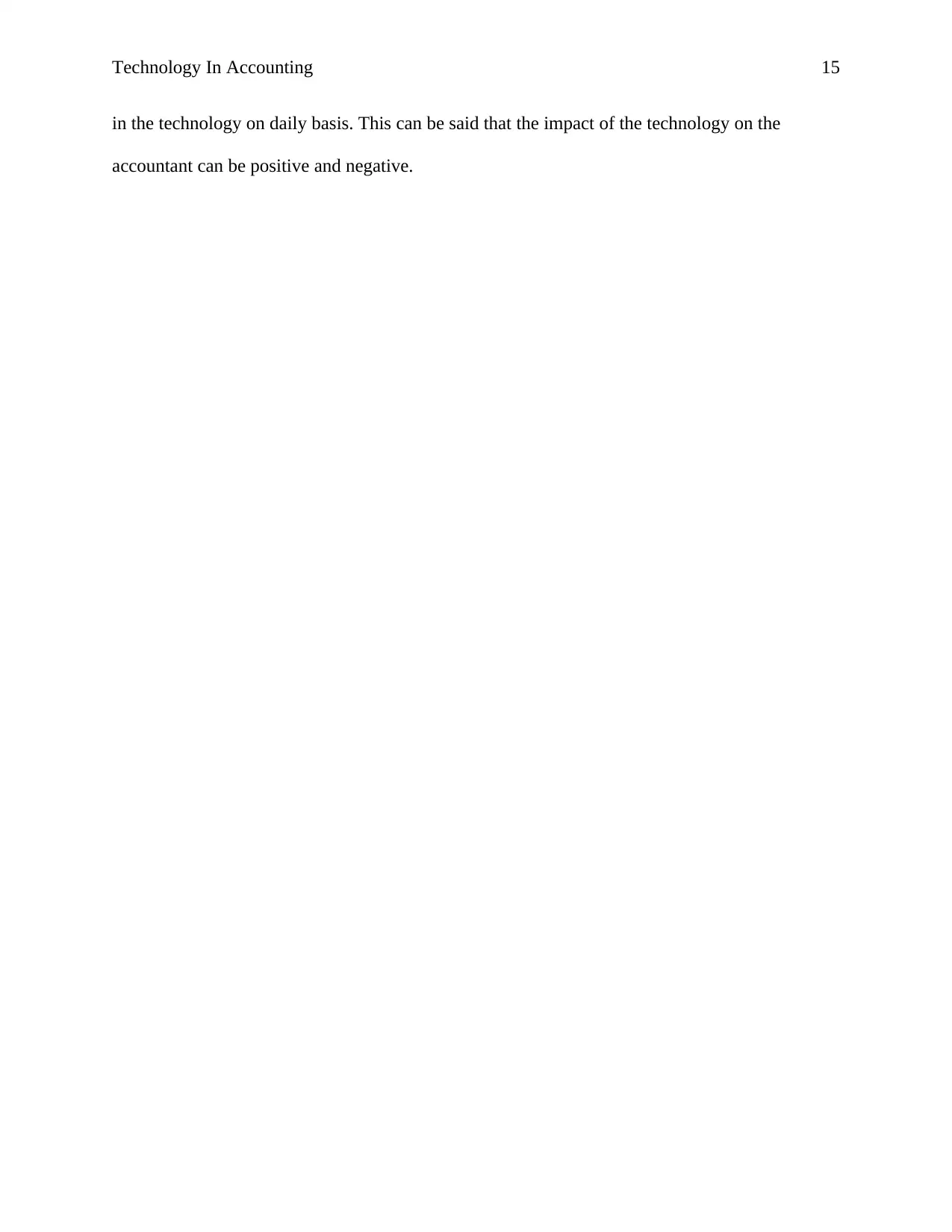
Technology In Accounting 15
in the technology on daily basis. This can be said that the impact of the technology on the
accountant can be positive and negative.
in the technology on daily basis. This can be said that the impact of the technology on the
accountant can be positive and negative.
Secure Best Marks with AI Grader
Need help grading? Try our AI Grader for instant feedback on your assignments.
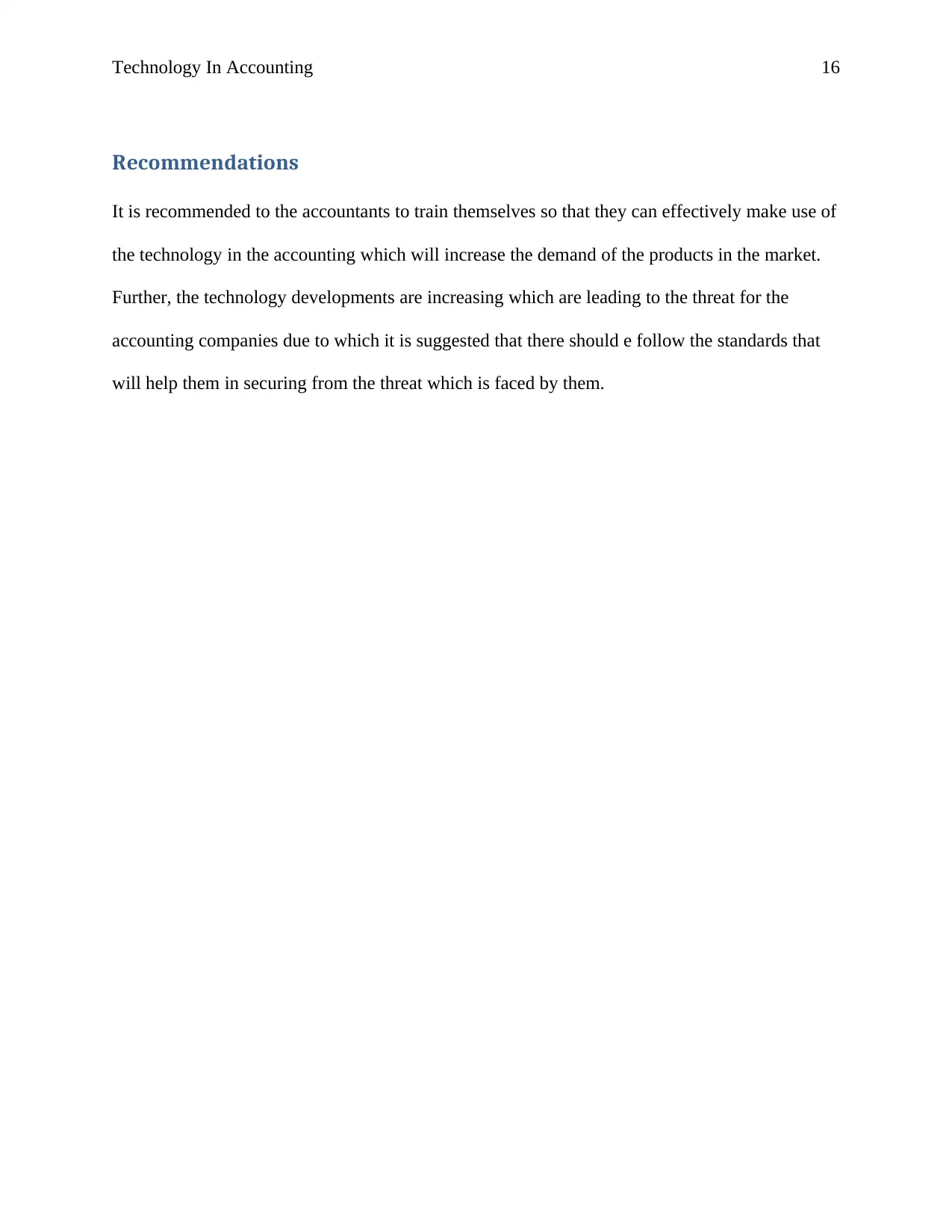
Technology In Accounting 16
Recommendations
It is recommended to the accountants to train themselves so that they can effectively make use of
the technology in the accounting which will increase the demand of the products in the market.
Further, the technology developments are increasing which are leading to the threat for the
accounting companies due to which it is suggested that there should e follow the standards that
will help them in securing from the threat which is faced by them.
Recommendations
It is recommended to the accountants to train themselves so that they can effectively make use of
the technology in the accounting which will increase the demand of the products in the market.
Further, the technology developments are increasing which are leading to the threat for the
accounting companies due to which it is suggested that there should e follow the standards that
will help them in securing from the threat which is faced by them.
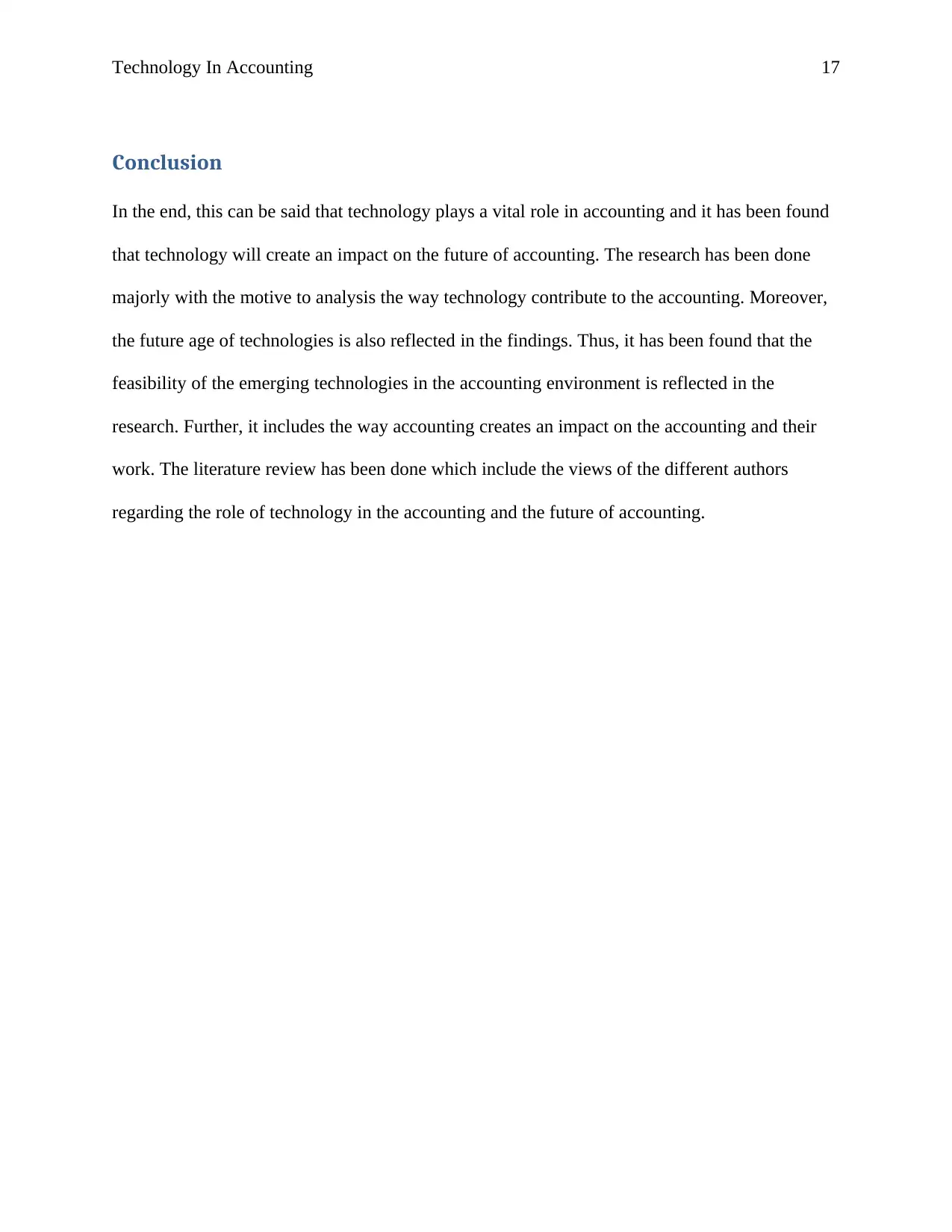
Technology In Accounting 17
Conclusion
In the end, this can be said that technology plays a vital role in accounting and it has been found
that technology will create an impact on the future of accounting. The research has been done
majorly with the motive to analysis the way technology contribute to the accounting. Moreover,
the future age of technologies is also reflected in the findings. Thus, it has been found that the
feasibility of the emerging technologies in the accounting environment is reflected in the
research. Further, it includes the way accounting creates an impact on the accounting and their
work. The literature review has been done which include the views of the different authors
regarding the role of technology in the accounting and the future of accounting.
Conclusion
In the end, this can be said that technology plays a vital role in accounting and it has been found
that technology will create an impact on the future of accounting. The research has been done
majorly with the motive to analysis the way technology contribute to the accounting. Moreover,
the future age of technologies is also reflected in the findings. Thus, it has been found that the
feasibility of the emerging technologies in the accounting environment is reflected in the
research. Further, it includes the way accounting creates an impact on the accounting and their
work. The literature review has been done which include the views of the different authors
regarding the role of technology in the accounting and the future of accounting.
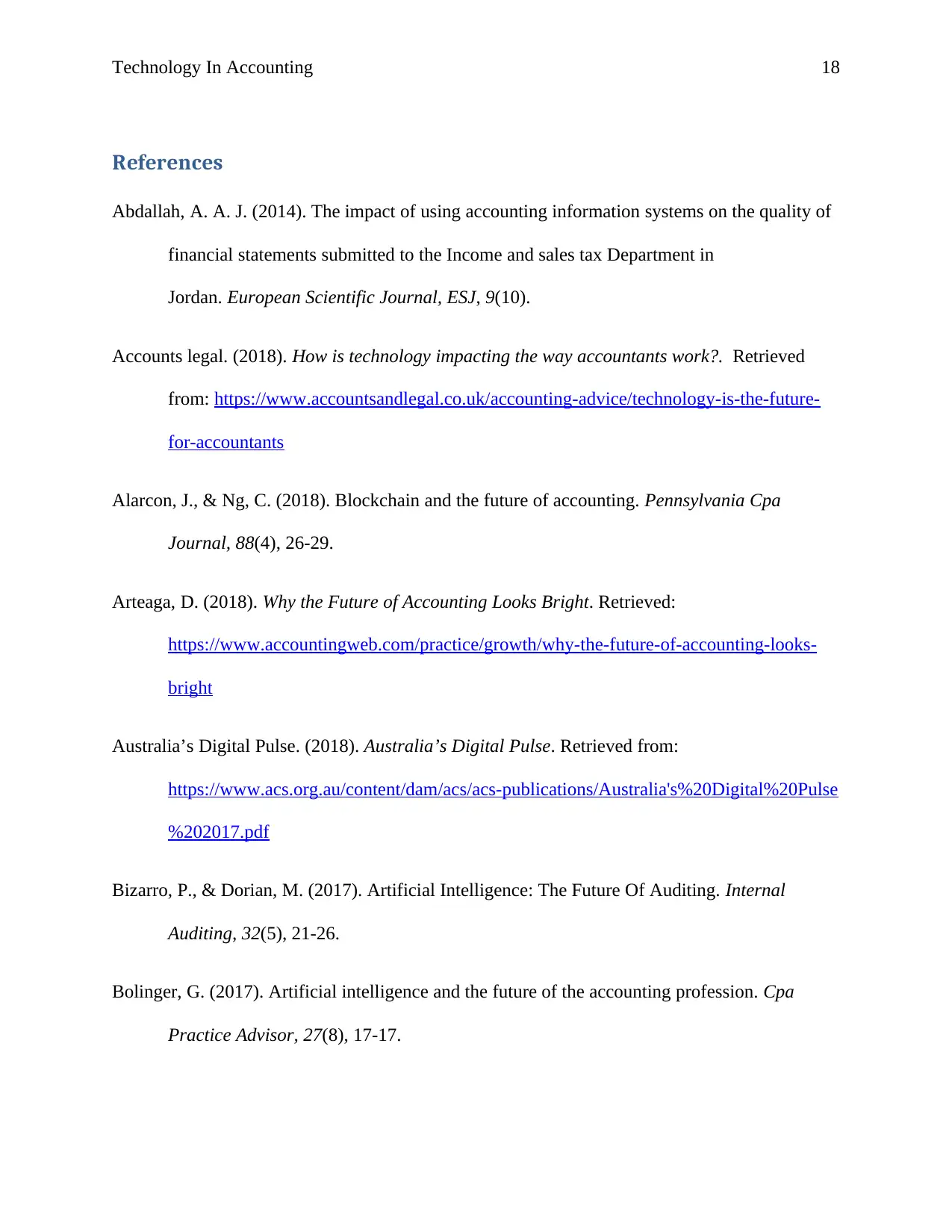
Technology In Accounting 18
References
Abdallah, A. A. J. (2014). The impact of using accounting information systems on the quality of
financial statements submitted to the Income and sales tax Department in
Jordan. European Scientific Journal, ESJ, 9(10).
Accounts legal. (2018). How is technology impacting the way accountants work?. Retrieved
from: https://www.accountsandlegal.co.uk/accounting-advice/technology-is-the-future-
for-accountants
Alarcon, J., & Ng, C. (2018). Blockchain and the future of accounting. Pennsylvania Cpa
Journal, 88(4), 26-29.
Arteaga, D. (2018). Why the Future of Accounting Looks Bright. Retrieved:
https://www.accountingweb.com/practice/growth/why-the-future-of-accounting-looks-
bright
Australia’s Digital Pulse. (2018). Australia’s Digital Pulse. Retrieved from:
https://www.acs.org.au/content/dam/acs/acs-publications/Australia's%20Digital%20Pulse
%202017.pdf
Bizarro, P., & Dorian, M. (2017). Artificial Intelligence: The Future Of Auditing. Internal
Auditing, 32(5), 21-26.
Bolinger, G. (2017). Artificial intelligence and the future of the accounting profession. Cpa
Practice Advisor, 27(8), 17-17.
References
Abdallah, A. A. J. (2014). The impact of using accounting information systems on the quality of
financial statements submitted to the Income and sales tax Department in
Jordan. European Scientific Journal, ESJ, 9(10).
Accounts legal. (2018). How is technology impacting the way accountants work?. Retrieved
from: https://www.accountsandlegal.co.uk/accounting-advice/technology-is-the-future-
for-accountants
Alarcon, J., & Ng, C. (2018). Blockchain and the future of accounting. Pennsylvania Cpa
Journal, 88(4), 26-29.
Arteaga, D. (2018). Why the Future of Accounting Looks Bright. Retrieved:
https://www.accountingweb.com/practice/growth/why-the-future-of-accounting-looks-
bright
Australia’s Digital Pulse. (2018). Australia’s Digital Pulse. Retrieved from:
https://www.acs.org.au/content/dam/acs/acs-publications/Australia's%20Digital%20Pulse
%202017.pdf
Bizarro, P., & Dorian, M. (2017). Artificial Intelligence: The Future Of Auditing. Internal
Auditing, 32(5), 21-26.
Bolinger, G. (2017). Artificial intelligence and the future of the accounting profession. Cpa
Practice Advisor, 27(8), 17-17.
Paraphrase This Document
Need a fresh take? Get an instant paraphrase of this document with our AI Paraphraser
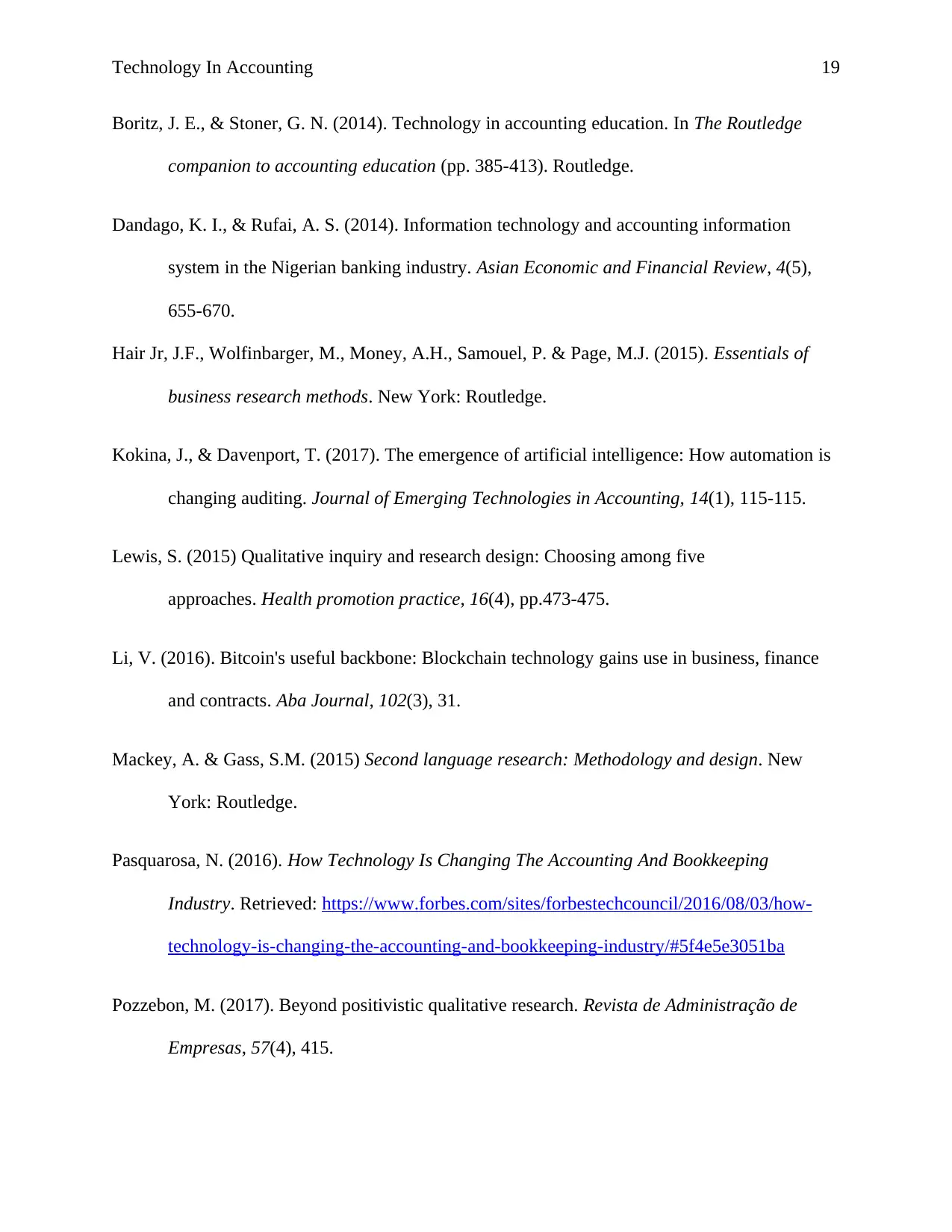
Technology In Accounting 19
Boritz, J. E., & Stoner, G. N. (2014). Technology in accounting education. In The Routledge
companion to accounting education (pp. 385-413). Routledge.
Dandago, K. I., & Rufai, A. S. (2014). Information technology and accounting information
system in the Nigerian banking industry. Asian Economic and Financial Review, 4(5),
655-670.
Hair Jr, J.F., Wolfinbarger, M., Money, A.H., Samouel, P. & Page, M.J. (2015). Essentials of
business research methods. New York: Routledge.
Kokina, J., & Davenport, T. (2017). The emergence of artificial intelligence: How automation is
changing auditing. Journal of Emerging Technologies in Accounting, 14(1), 115-115.
Lewis, S. (2015) Qualitative inquiry and research design: Choosing among five
approaches. Health promotion practice, 16(4), pp.473-475.
Li, V. (2016). Bitcoin's useful backbone: Blockchain technology gains use in business, finance
and contracts. Aba Journal, 102(3), 31.
Mackey, A. & Gass, S.M. (2015) Second language research: Methodology and design. New
York: Routledge.
Pasquarosa, N. (2016). How Technology Is Changing The Accounting And Bookkeeping
Industry. Retrieved: https://www.forbes.com/sites/forbestechcouncil/2016/08/03/how-
technology-is-changing-the-accounting-and-bookkeeping-industry/#5f4e5e3051ba
Pozzebon, M. (2017). Beyond positivistic qualitative research. Revista de Administração de
Empresas, 57(4), 415.
Boritz, J. E., & Stoner, G. N. (2014). Technology in accounting education. In The Routledge
companion to accounting education (pp. 385-413). Routledge.
Dandago, K. I., & Rufai, A. S. (2014). Information technology and accounting information
system in the Nigerian banking industry. Asian Economic and Financial Review, 4(5),
655-670.
Hair Jr, J.F., Wolfinbarger, M., Money, A.H., Samouel, P. & Page, M.J. (2015). Essentials of
business research methods. New York: Routledge.
Kokina, J., & Davenport, T. (2017). The emergence of artificial intelligence: How automation is
changing auditing. Journal of Emerging Technologies in Accounting, 14(1), 115-115.
Lewis, S. (2015) Qualitative inquiry and research design: Choosing among five
approaches. Health promotion practice, 16(4), pp.473-475.
Li, V. (2016). Bitcoin's useful backbone: Blockchain technology gains use in business, finance
and contracts. Aba Journal, 102(3), 31.
Mackey, A. & Gass, S.M. (2015) Second language research: Methodology and design. New
York: Routledge.
Pasquarosa, N. (2016). How Technology Is Changing The Accounting And Bookkeeping
Industry. Retrieved: https://www.forbes.com/sites/forbestechcouncil/2016/08/03/how-
technology-is-changing-the-accounting-and-bookkeeping-industry/#5f4e5e3051ba
Pozzebon, M. (2017). Beyond positivistic qualitative research. Revista de Administração de
Empresas, 57(4), 415.
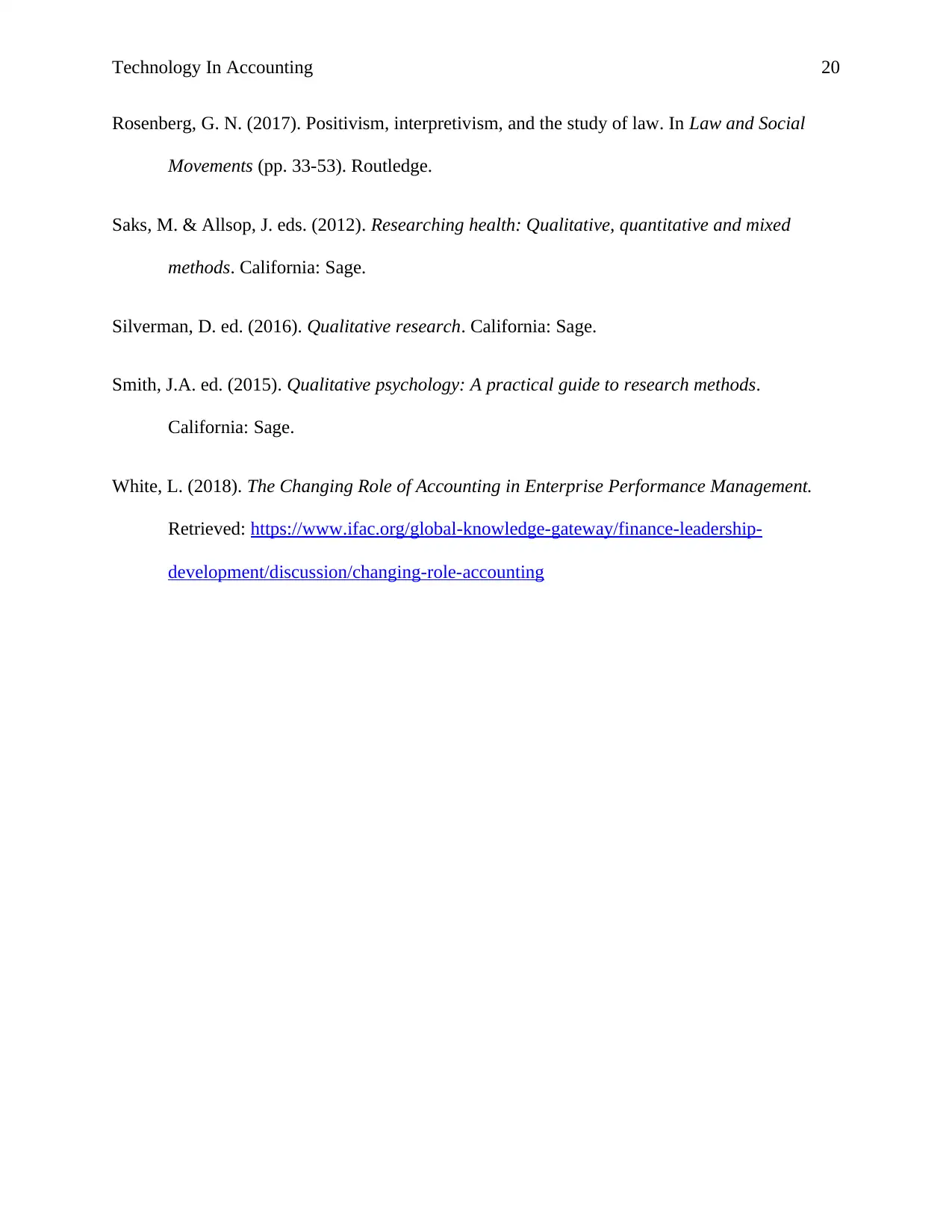
Technology In Accounting 20
Rosenberg, G. N. (2017). Positivism, interpretivism, and the study of law. In Law and Social
Movements (pp. 33-53). Routledge.
Saks, M. & Allsop, J. eds. (2012). Researching health: Qualitative, quantitative and mixed
methods. California: Sage.
Silverman, D. ed. (2016). Qualitative research. California: Sage.
Smith, J.A. ed. (2015). Qualitative psychology: A practical guide to research methods.
California: Sage.
White, L. (2018). The Changing Role of Accounting in Enterprise Performance Management.
Retrieved: https://www.ifac.org/global-knowledge-gateway/finance-leadership-
development/discussion/changing-role-accounting
Rosenberg, G. N. (2017). Positivism, interpretivism, and the study of law. In Law and Social
Movements (pp. 33-53). Routledge.
Saks, M. & Allsop, J. eds. (2012). Researching health: Qualitative, quantitative and mixed
methods. California: Sage.
Silverman, D. ed. (2016). Qualitative research. California: Sage.
Smith, J.A. ed. (2015). Qualitative psychology: A practical guide to research methods.
California: Sage.
White, L. (2018). The Changing Role of Accounting in Enterprise Performance Management.
Retrieved: https://www.ifac.org/global-knowledge-gateway/finance-leadership-
development/discussion/changing-role-accounting
1 out of 21
Related Documents
Your All-in-One AI-Powered Toolkit for Academic Success.
+13062052269
info@desklib.com
Available 24*7 on WhatsApp / Email
![[object Object]](/_next/static/media/star-bottom.7253800d.svg)
Unlock your academic potential
© 2024 | Zucol Services PVT LTD | All rights reserved.





